#virus removal experts
Explore tagged Tumblr posts
Text
A type of flu virus that used to sicken people every year hasn't been spotted anywhere on Earth since March 2020. As such, experts have advised that the apparently extinct viruses be removed from next year's flu vaccines. The now-extinct viruses were a branch of the influenza B family tree known as the Yamagata lineage. Scientists first reported the apparent disappearance of Yamagata viruses in 2021. At that time, experts speculated that precautions taken to stop the spread of COVID-19 — such as masking and social distancing — had not only driven the overall number of flu cases to historic lows but may have completely snuffed out this type of flu virus.
Continue Reading.
21K notes
·
View notes
Text

Medic, Maverick, Maniac, Murderer: Understanding Pharma
First thing’s first: I love Pharma, dearly.
In all the time I’ve spent evaluating his character, I’ve mainly focused on what can be worked out about who he is as an individual: his core sense of self, psychological drives, subjective worldview, etc.
When all else is stripped away, who is Pharma?
This treatise is the product of obsessing over Pharma, analyzing canon (and extras), and reading as many different perspectives on his character from fans across the fandom as I could find. The post is long, so for those of you who balk at the thought of reading a shortfic’s worth of Pharma thoughts, feel free to read the TL;DR (Conclusion) at the end and then decide if the full read is worth your time. Also, a premium reading experience is available in the form of the original Google Doc version.
As you read, keep in mind that this is primarily a mix of psychoanalysis, evidence-based examination, and speculation—not moral, ethical, or sociological commentary. The goal is to examine Pharma’s psychological drives and core values, and each of his appearances in the context of those. All other types of evaluation are up to readers.
Now, take your victim blaming-allergy meds (just in case); remove your black-and-white thinking caps; and leave your personal morality lenses at the door.
Psychological Drives & Core Values
Why does Pharma act the way he does? What gives him a reason to keep living? What are his personal priorities?
At the beginning of the Delphi arc, First Aid establishes Pharma as a “control freak” and someone who “thinks he’s an expert on everything.”

Now, First Aid has a habit of complaining about his bosses, but on both points, there’s canon evidence to back them both.
Expertise and Intellect
Throughout the Delphi and Luna 1 arcs, it’s established that Pharma is a skilled and brilliant doctor.
He once performed a 4-way fuel pump transplant, donating his own fuel pump in the process. (see above panel)
Later, he invented a soundbomb that left an echo laced with a virus and invented an antidote to that virus:
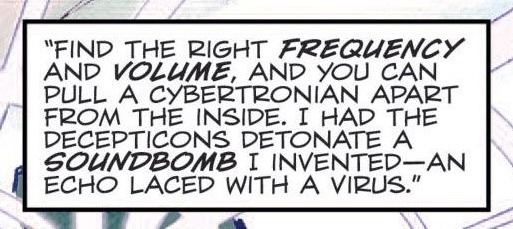
And on Luna 1, he was on the edge of finding a cure for Cybercrosis, based on the fact that Swerve was able to formulate a cure from his notes.
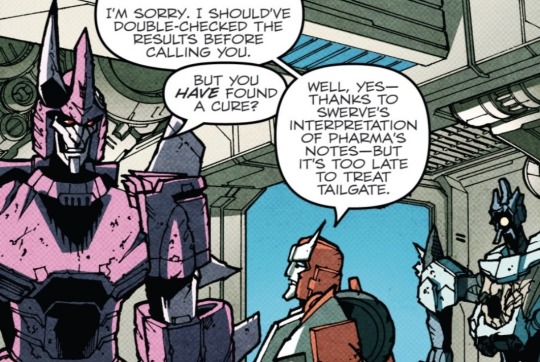
More than being a doctor, Pharma lives for intellectual and scientific achievement as a physician scientist. He feels most alive when he’s able to solve complex medical problems, and when his achievements are recognized by those whose opinion he considers important.
This is Pharma’s 'why.'
And even though he’s arrogant and enjoys praise, it’s not his primary motivation. He doesn’t need it in order to set his mind to whatever he’s interested in, although he’ll seek it from those he values most (i.e. Ratchet).
Pharma sees himself as less of a doctor, and more as a scientific innovator or medical maverick. The practice of medicine is primarily a catalyst for his creativity and intellect; it’s not an end in and of itself like it is for someone like Ratchet or First Aid.
First Aid’s observation of Pharma can be better phrased as, “[Pharma] thinks he’s an expert on everything medical”—because he’s not so driven by achievement and admiration that he’ll grovel at the feet of strangers and get good at something he doesn’t personally find interesting. The only time we see him express a desire for praise is when he’s around Ratchet—someone he holds in high regard for both personal and professional reasons. This makes sense since Ratchet is one of the only people who can give Pharma any kind of competition within what he considers to be his area of expertise.
“Each day we go to our work in the hope of discovering—in the hope that some one, no matter who, may find a solution of one of the pending great problems—and each succeeding day we return to our task with renewed ardor; and even if we are unsuccessful, our work has not been in vain, for in these strivings, in these efforts, we have found hours of untold pleasure, and we have directed our energies to the benefit of mankind.” —Nikola Tesla
Ego
Without question, Pharma has an inflated ego, but having an inflated sense of self doesn’t automatically mean a person is a full-blown narcissist or that they are totally uncaring.
Every personality trait exists on a spectrum. Yes, Pharma is arrogant, but the presence of arrogance doesn’t automatically and completely cancel out all “positive” traits. (For fun, check out studies on Dark Tetrad and Light Triad personality traits.)
People are complex. Arrogance can coexist with genuine kindness, ruthlessness can coexist with deep compassion, etc.
Whether Pharma exhibits genuine kindness is up to each reader’s interpretation of what little canon material exists, but the point is: Pharma’s arrogance doesn’t automatically rule out the possibility of authentic “positive” traits.
Controlling Tendencies
Pharma is comfortable pulling the power card and using it to dump what he sees as uninteresting parts of medical practice on those below him:
“So Fisitron’s writing about the Wreckers’ elbows now, is he?” said Delphi’s Chief Medical Officer. “Come on, First Aid - get to it. You’ve got a Fader in Row 2 downstairs.” He squeezed the air with his finger and thumb. “He’s about this far from shutdown.” —from Bullets by James Roberts
However, there’s nothing in canon indicating he’s power-hungry in a megalomaniacal sense. He’s not Starscream or Megatron; he doesn’t seek political or social power. In fact, he seems perfectly happy hiding away in a lab or medibay by himself so he can direct all his energy toward solving issues and achieving the so-called ‘impossible’ within the field of medicine:
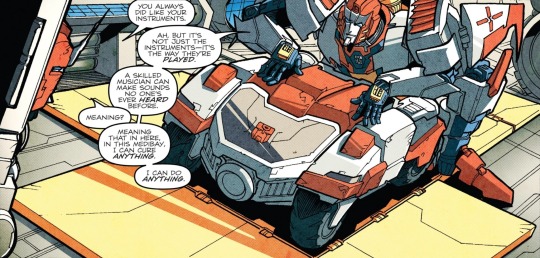
The ways in which Pharma exercises power and control are through his expertise, and his administrative/management skills. That’s it.
Self-confidence
Pharma’s arrogance and controlling tendencies don’t seem to be a mask—like he’s trying to compensate for some sense of lack (in those areas). Yes, he fears failure, and yes, he displays some insecurity when Ratchet questions his competence. But at every other point and in every other way, Pharma is unapologetically self-confident. He’s fully self-assured of his intellectual prowess and problem-solving capabilities; he knows what he knows, and he also knows what he doesn’t know.
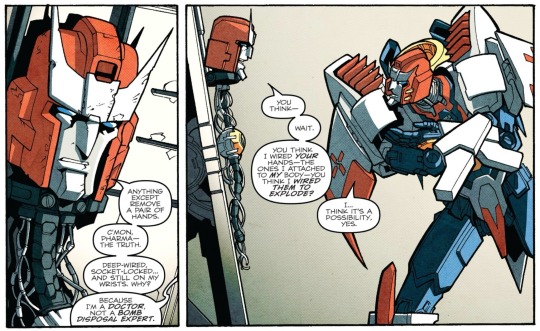
Pharma’s arrogance and desire for control don’t stem from a hidden lack of confidence or a hunger for power on its own. They stem from the fact that he genuinely sees himself as the best person for the work he does. He trusts himself above anyone else to solve problems that come his way—medical or otherwise (within limits).
Elitism vs. Superiority
I’ve always read Pharma as having an elitist attitude, but not in the social stratification sense:
elitist (adj.) relating to or supporting the view that a society or system should be led by an elite.
There’s no evidence that Pharma believes an elite class of people should hold the most power. Instead, Pharma’s “elitism” is actually an individualistic sense of superiority. It’s centered on him alone, and is tied to his capabilities as a physician scientist and surgeon.
Pharma sees himself as the best of the best and makes sure everyone knows it—sometimes through his words, but mostly by his conduct in the field of medicine. This, paired with Pharma’s natural temperament, doesn’t exactly make him socially popular—inside or outside of medicine:
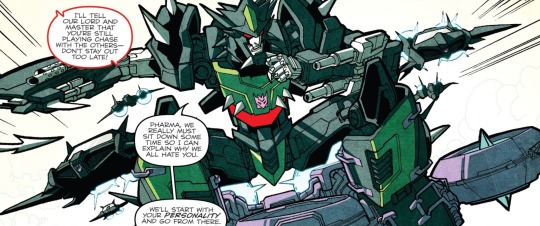
One could argue that the “personality” Lockdown is referring to was a result of all Pharma had suffered at Delphi and Luna 1, but just as easily, one could argue he was always a bit difficult to get along with, and that his traumatic experiences merely magnified his already-present psychological patterns. Personally, I like the latter interpretation because it’s a flaw that makes Pharma a more interesting character no matter his mental state.
Everyone reacts differently to real and perceived social rejection. Some are so concerned about it that they’ll try anything to belong; others genuinely don’t care, and they continue as usual; and still others cope by shifting their mindset and developing a sense of pride in being an outsider.
There’s no evidence for this in canon, but I believe it’s within reasonable characterization boundaries to headcanon Pharma as being in the second or third category.
With either of those two mindsets, a sense of superiority can develop, or even be an inciting factor. Either someone sees themselves as genuinely superior to the majority and doesn’t mind when this alienates them from people, or they convince themselves they’re superior because the pain of accepting they were rejected for who they are is too much to handle.
Whatever the case, the point is, having an “elitist” attitude isn’t necessarily rooted in a sociological or ideological belief. Sometimes, individuals just see something in themselves that—to them—justifies a sense of personal superiority. A quick glance at Pharma’s canon appearances makes it clear he holds such a view of himself, at least to some degree.
Morality and Compassion
When Pharma first shows up in canon, he’s working at the New Institute. A lot of questionable things took place there on a regular basis—things Pharma would have been aware of, to some degree. However, his presence at the Institute doesn’t automatically mean he agreed with everything happening. Depending on how strongly someone feels about something, some people are content to disagree in silence. Not everyone who seeks employment considers it a priority that the establishment they work for aligns perfectly with their moral values. After all, there are other reasons to take a job: financial benefits, exclusive educational and career opportunities, pure convenience, etc.
I’m not here to say either way whether Pharma’s willingness to turn a blind eye to the events at the New Institute was wrong or right; that’s up to each reader to decide for themselves. However, Pharma’s choice to remain employed at the Institute for some time can say something about him as a character: his priority as a doctor and person is not to take care of everyone he encounters, or to act as some kind of moral or ethical authority.
This isn’t to say Pharma won’t ever stand up for something he regards as right or push back against something he sees as wrong, “off screen.” It’s just that everything in canon points more to a tendency to choose his battles instead of acting immediately on any moral sense the way someone like Optimus or Ratchet might.
This also isn’t to say Pharma doesn’t care about saving lives, but from what little is shown of him before Delphi, it’s hard to say how much he cared. Ratchet confirms later that Pharma was an excellent doctor for most of his life, but all that tells us is he was an excellent doctor; it says nothing about his internal attitude toward his work or patients.
However, inferences can be made based on doctors in our own world:
Being a doctor—especially one in trauma care—is far from easy. It takes a lot out of a person, and there are very few people who last in the profession for a long time. Most medical professionals fall into one of the following categories:
People possessing a strong will that’s coupled with an unwavering passion for taking care of others (the public’s favorite)
People who naturally have, or develop, an ability to switch their empathy off and on at will, or build walls around it—also possessing a strong will (the ideal)
People who naturally have a limited capacity for empathy (the one the public hates to acknowledge)
People with a strong social and professional support system (the necessary, but underutilized and underappreciated factor)
Of course, even if a person has one or more of the above, burnout can and does still happen, but individuals who have at least one have the best chances of surviving and thriving amidst the demands of the majority of medical professions.
As far as is shown in canon, Pharma never had a strong support system—either circumstantially or by choice—so something else was keeping him in medicine.
Pharma shows concern for both Tumbler (Chromedome) and Hubcap:
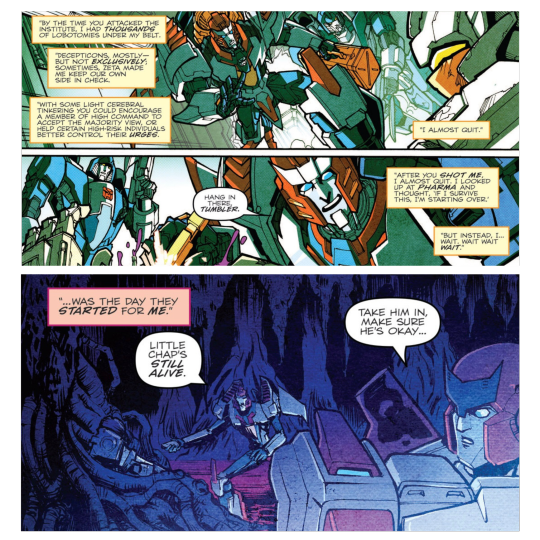
But even though he obviously cared enough to step in, neither instance makes a strong case for a capacity for empathy beyond the “average” or “norm.” Performing a job well is a lot different from being personally invested in the work.
Based on everything up to this point, and this later comment from Pharma, about Ratchet…
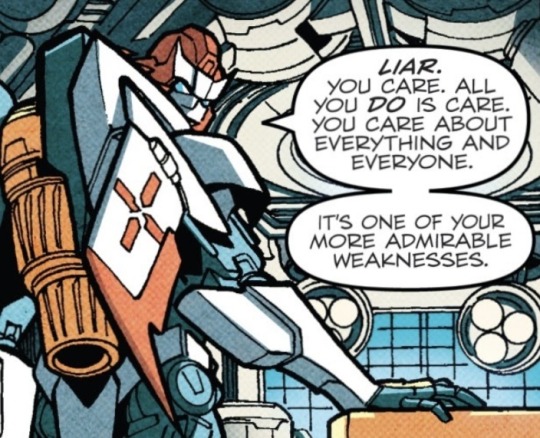
…Pharma has probably never shared the same I-care-about-everything-and-everyone view of the world. Instead, it’s more likely that Pharma holds a more rational view of his work and patients.
One of the first things learned in medicine, especially in trauma medicine, is that you can’t help or save everyone, and to hold yourself to that standard can destroy you quickly if you have a certain temperament or lack healthy boundaries for your empathy.
“There are times when it may seem as though I view sick or injured people not as living, breathing humans with feelings and emotions and people who love them, but simply as cases, as problems to be solved. And that is absolutely true. It's not that I don't have empathy, but the hard fact is that as a doctor, and especially as a trauma surgeon, too much empathy can get in the way of your job and cause you to make decisions based not on sound medical judgment but on your own emotions. Sure, I've seen things that even years later can still make me choke up when I think of them: a little girl shot and killed, a shattered young Marine who shouldn't have died but did. But you can't choke up in the ER or the operating room. To be effective as a trauma surgeon, you have to put a layer of Kevlar around your heart.” —Dr. Peter Rhee, Trauma Red: The Making of a Surgeon in War and in America’s Cities*
Pharma may have learned this difficult truth earlier than Ratchet and developed a practical way of managing his empathy that comes across as “cold.” He may have always had an ability to put up walls around his spark. Or, he may have always had little to no capacity for empathy.
The fact that the morality lock on Tyrest’s portal prevented Pharma from passing through proves he felt guilty for what he’d done, and JRO confirmed this. Therefore, it’s safe to assume Pharma had some level of empathy for his former patients, suffering moral injury when he felt he had no other option but to start killing them.
Still, looking at Pharma’s psychological drives and his behavior throughout canon, it’s clear compassionate care and morality are subordinate to his other values and interests.
*I highly recommend this book, and learning about Dr. Rhee in general. He’s a huge inspiration of mine, and one of my main sources of inspiration when writing Pharma. Level-headed and capable, strong-willed, selectively empathetic, an excellent scientist, etc. He lives for the thrill of practicing medicine both on the floor and as an expert in his field who pushes trauma medicine to new heights through his research. He also takes great pride in his hands. Seriously—the man spent an entire paragraph and a half talking about his “good hands” and how they were one of two reasons he decided to go into trauma surgery. The other reason was that he “liked action and excitement, liked the feeling of being able to walk into a tough situation and take control.” (Sounds familiar���)
Delphi
First thing’s first: we don’t know how much Pharma did or didn’t know about the DJD before agreeing to take the Delphi assignment.
That far into the war, he would have known something about the DJD and their ways of terrorizing traitors and Autobots, but for whatever reason, he took the assignment anyway. Perhaps Prowl assured him the situation on Messatine would be monitored and that the security team would be enough. Perhaps he underestimated the DJD’s capabilities, or scale of territory, and thought he would be able to handle things on his own. Perhaps Prowl gave him no choice. Maybe it was all of these and more.
Whatever the case, according to JRO, Pharma didn’t hate Delphi before the incident with the DJD.
Word of god remains a touchy subject in fandom, but in this case, it’s important because it says two things:
The DJD left the Delphi medical team alone for some time.
Being on the edges of DJD territory didn’t automatically mean isolation and harassment by their hand.
On the second point, First Aid was free to come and go from Messatine as he pleased, seeing as he attended a medical conference at Kimia five years into his assignment at Delphi:
Five years ago [mid-Delphi assignment], the leader of the Wreckers had cornered him at a medical conference at Kimia, the space station that doubled as a weapons research facility. —from Bullets
And five years after that, he was able to not only contact Springer without delay about one of Agent 113’s bullets he’d discovered in an Autobot badge…
He raced upstairs to his computer terminal and typed in a certain frequency code for the second time in his life. A face appeared on the screen and grinned. “It’s me,” said First Aid. “And you're never gonna guess what I’ve got for you..!”
…but he was also able to meet up with Springer to hand off the bullet:
“Your friend has a funny way of making contact,” First Aid had said when he’d got in touch three days earlier, and he was right.
It’s not known if this handoff happened on or off world, but either way, the DJD didn’t interfere.
At some point, Tarn set his sights on Pharma and the Delphi team. Knowing the DJD, one can only imagine what Tarn used to show off his team’s capabilities and convince Pharma the best option was to cooperate.
In striking a deal with Tarn to keep the DJD away from Delphi, Pharma established his territory and ensured his continued security and the safety of his staff. As long as Tarn got his T-cogs, Pharma could continue on in relative peace. He could work his magic on bots that ended up at Delphi, carry out his management duties, and work on whatever projects or research he may have been conducting in his free time.
For whatever reason, after he first came into contact with Tarn, Pharma didn’t call for help. Communications were still operational, as Pharma wouldn’t have suggested contacting High Command about the Duobots if the team was aware of any comm malfunctions:
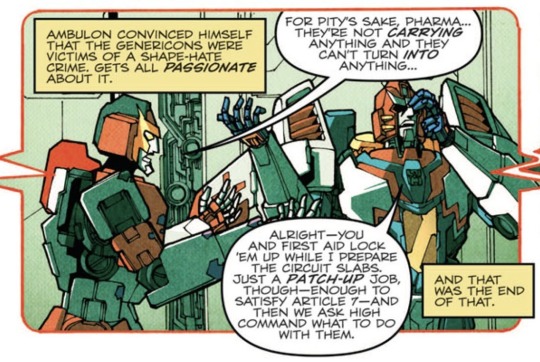
Also, First Aid later confirms that communications were fine until the Big Bang (soundbomb detonation):
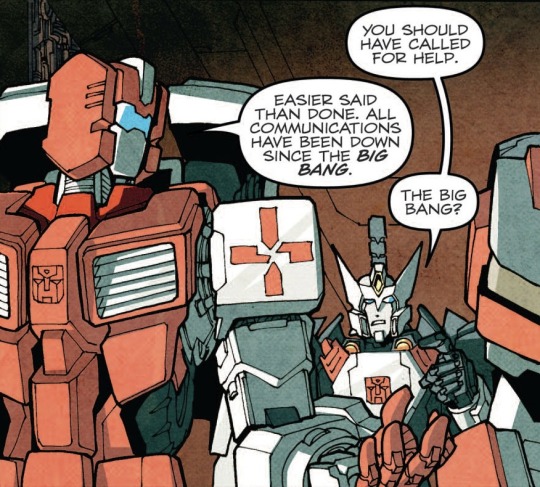
It’s always possible the DJD was monitoring the radio waves, but secure subspace frequencies exist, such as the Datalog Network First Aid used to send the datalog containing the death statistics:

Speaking of which, assuming First Aid sent the datalog with the statistics right when things started to get ‘weird,’ and before the Big Bang shut down comms, it only took—at most—a few days for them to reach Ratchet and Swerve on the Lost Light:

But back to Pharma not calling for help: for all of Prowl’s intel, contingency planning, and fretting over the security of Autobot territories, I find it hard to believe he would have stuck an Autobot medical team on the fringes of DJD territory without giving them some means of securely contacting the outside in case of issues.
But even if Prowl didn’t give Pharma a secure way to contact him or anyone else, and even if Pharma was convinced the DJD was monitoring regular communications, there were other ways he could have reached out for help. After all, the team wasn’t alone on Messatine. Like Pharma said, Prowl continued to send bots to defend the nucleon mines:
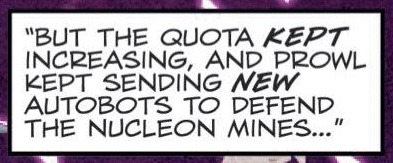
The Autobots had been mining nucleon for millions of years at this point, so I doubt the mined nucleon was just sitting in storage on Messatine; shipments of the stuff would have been sent off-world to wherever the Autobots needed it. Why not send a message for Prowl with someone leaving with one of those shipments? A message meant only to be sent over a call when absolutely certain they were out of range of the DJD’s potential monitoring.
Or, why not order in off-world medical supplies and send a message back with the delivery bot(s)?
There are two possible answers to this. One takes into account JRO’s word on the subject; the other is more intricate and speculative on my part, but it leads to the same place. So whatever your stance is on the validity of word of god, there’s an answer for you.
Answer one (word of god)
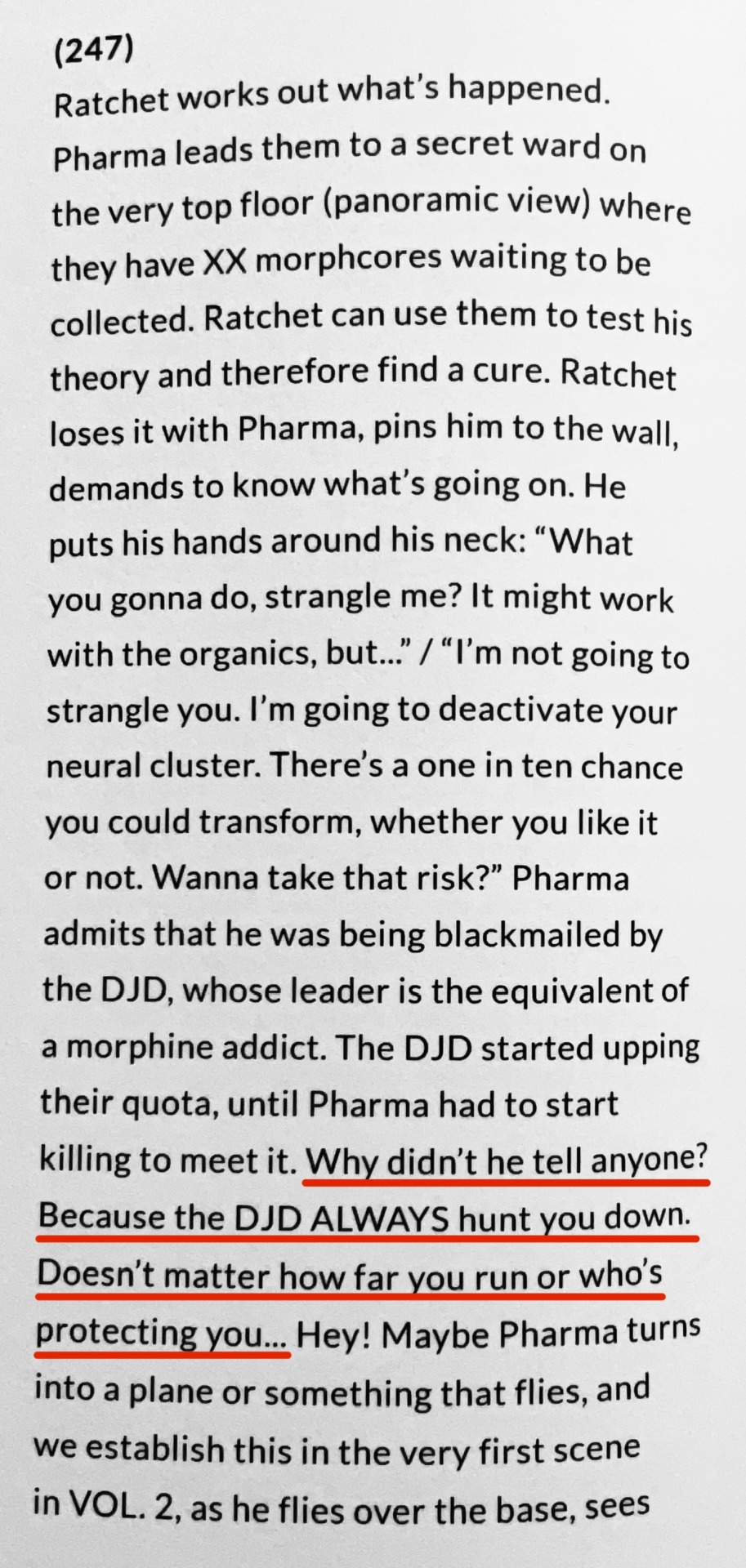
Simple as that. Pharma was aware of the scope of the DJD’s capabilities and relentlessness, and determined he was trapped prey.
Answer two (no word of god)
There are a few possible reasons Pharma didn’t call for help right away:
He was convinced all his other options would take too long and/or would still lead to him being put under suspicion. After all, being found to have harvested even a single T-cog from an already-dead patient for the DJD could have raised concerns that would lead to Pharma being investigated and/or having a mark put on his record.
He underestimated the severity of Tarn’s addiction, and was certain he could keep up with the T-cog demand without resorting to other means of harvesting, not realizing Tarn’s quota would increase later on.
He was already paranoid as a result of whatever mind games Tarn had set in motion at their first meeting, making Pharma think escape was futile.
Word of god or no word of god, there are clear reasons as to why Pharma ended up trapped. Most likely, it was a mix of all of the above.
Whatever was going on in Pharma’s mind before, he ended up in deeper trouble. Tarn increased his demand for T-cogs, and Pharma couldn’t keep up. By the time this happened, even if he had wanted to call for help, it was too late to do so without implicating himself. He reasoned his only option was to start killing patients to harvest their T-cogs.
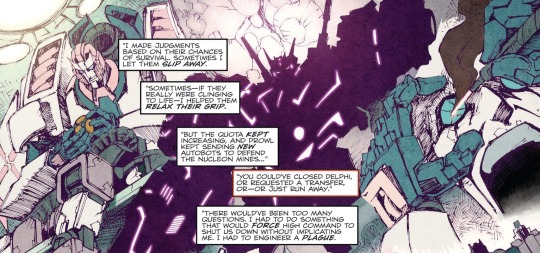
Soon, Pharma was so consumed with fretting over whether he’d be able to meet Tarn’s next demand that he didn’t have time or freedom to do anything else except worry and feel guilty. His whole life revolved around Tarn’s addiction; he was no longer in control, and could no longer enjoy whatever it was about Delphi he’d previously enjoyed. Perhaps the facility itself enabled Pharma to research cures and perform scientific miracles of medicine.
Being at the mercy of Tarn—convinced the DJD would find him no matter what—would have been pure psychological torture on its own, but also knowing that any small chance he did have of getting help would end in him losing everything would have added to his suffering. Pharma became desperate to reclaim control over his life and began planning an escape.
Now, JRO has said that Pharma didn’t originally plan to use the rust plague on the DJD…but canon says otherwise:

Of course, Pharma could have been lying to make himself look better in Ratchet’s view, but based on everything he’d been through up to this point with Tarn, it’s more likely he was telling the truth and had tried to eliminate the source of his suffering first. After all, wiping out the DJD would have been the simpler, cleaner option.
When the Duobots refused to detonate the soundbomb near the DJD, Pharma’s objectives shifted. He had to get Delphi shut down in a way that would:
Convince the DJD the shutdown was legitimate.
Pharma knew chances of escaping the DJD at all were slim to none, but he was desperate. Getting Delphi shut down would cut off Tarn’s supply of T-cogs and allow Pharma to escape Tarn’s immediate control, but the shutdown had to be “legitimate” to prevent Tarn from retaliating and hunting him down later. Leaving Tarn even the slightest chance of regaining control was too risky, so Pharma had to make sure his plan was as airtight as possible.
Cover up the patient murders.
If the truth got out about Pharma killing patients, he’d lose his medical license and most likely be put away for life. Being cut off from the practice of medicine and his intellectually stimulating work as a doctor would mean losing more than a job and a reputation. It would mean losing everything in which he’d anchored his sense of identity and life’s meaning. His refusal to consider any other options wasn’t just about ego and preserving his image as an excellent doctor; it was about preserving any kind of meaningful future he saw for himself.
Pharma needed a plan that would fulfill all of the above. Turning the engineered virus on the medical facility was the most effective and efficient solution. Anything else would have made him suspicious in the view of either Autobot High Command or the DJD, and neither of those would have ended well for him.
Because of his goal to preserve his reputation and future in medicine, he couldn’t even risk revealing anything to First Aid or Ambulon, who would have seen to his ruin. They became nothing more than loose ends that had to be tied up, and based on the fact that Pharma only prepared one vial of the vaccine, his original plan involved him being the only survivor:
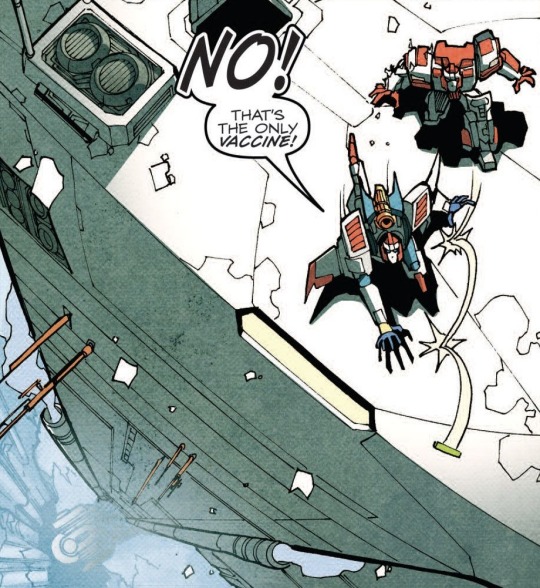
He probably would have had no problem making more of the vaccine for anyone else who survived, but he wasn’t counting on it. He wanted a totally clean slate; in letting his staff die with most of his patients, he would be getting rid of any and all evidence and reminders of his failures. He may have cared about First Aid and Ambulon before things got bad, but somewhere along the way, he decided either it wasn’t worth it to go through the trouble of finding a way to save them without raising suspicion, or he didn’t want to risk them putting together the pieces later on.
Of course, when Ratchet showed up, plans changed.
Ratchet
Ratchet is not the kind of person who seeks first to understand or be understanding. He’s inclined to trust what’s in front of him over anything abstract, and tends to look at the results of someone’s actions over trying to find any kind of ‘why’ behind them. Also, unlike Pharma, he operates from a strong moral sense, and reacts quickly and strongly when something or someone goes against that internal moral sense.
Ratchet’s reaction to finding out what Pharma did may seem hasty and harsh, but it makes perfect sense on a human level. There is no such thing as unconditional love; everyone has personal and moral lines (boundaries), and they’re different for each individual. When the most rigid of lines is crossed, that’s it; walls go up and the offender is cut off, no matter how strong the relationship may have been.
Ratchet obviously knew Pharma well enough to think he could try talking some sense into him, but then Pharma revealed that he’d crossed one of Ratchet’s lines: murdering patients. Any willingness Ratchet may have had to try to understand vanished. By the time Pharma started trying to provide a ‘why’ for his actions, Ratchet’s moral judgment had already shut down any chance of understanding what could have possibly led Pharma to kill patients. It didn’t help that Pharma seemed totally unapologetic and outright proud of his plan. For Ratchet, the ‘why’ didn’t matter anymore. What he saw was what he trusted, and what he saw was a friend who’d become his idea of a monster.
Now, Ratchet and Pharma’s relationship is one of the most confusing IDW relationships I’ve had the pleasure and pain of dissecting.
It is notoriously difficult to determine the depth and strength of a relationship from the outside. However, I’ve decided to go ahead and address it anyway because it has the potential to provide insight into Pharma as an individual.
If I were to sum up Pharma and Ratchet’s relationship in a single word, I would use “ambivalent.” The first time I read MTMTE, the thing that stood out to me most about their relationship was the drastic differences between how they each perceived the relationship.
In one sense, there’s the idea of Pharma basically being Ratchet’s crazy stalker ex, which is tossed around in fandom a lot. While I personally dislike seeing it regardless of context (yes, even as a joke), I do see how JRO’s writing choices set things up in a way that makes it easy to superimpose that trope.
In another sense, there’s the idea that Pharma and Ratchet were always close friends, and that what happened at the end of the Delphi story was a betrayal of both sides that came out of nowhere and whose consequences were taken too far.
I disagree with both. Personally, what I see at the end of the Delphi story isn’t an obsessed ex gone mad, a sudden betrayal, or a badly executed backstabbing. What I see is a breakdown of an already-complicated and poorly-maintained relationship: true feelings being revealed, long-repressed bitterness being forced to the surface, carefully-hidden cracks being split wide open.
Most people don’t have an accurate understanding of how much or how little they truly know the people in their lives, often overestimating how well they know a person until something surfaces and blindsides them.
According to JRO, Ratchet was oblivious to Pharma’s romantic interest, and throughout canon, it’s easy to see Pharma was more invested in the relationship than Ratchet ever was.
The question is, did Ratchet ever care about Pharma at all? And if so, to what degree?
Yes, Ratchet calls Pharma “buddy” and “friend,” but the former was sarcastic, and the latter means something different to each person. Also, in light of the circumstances, Ratchet could have just been saying “friend” in response to Pharma saying it—an emotional appeal more than anything.
However, Pharma must have been aware of Ratchet’s lack of relational investment because during the confrontation at Delphi, Pharma’s first reaction wasn’t to appeal to their friendship (ex: “But you know me!”). Instead, he appealed to their shared profession:
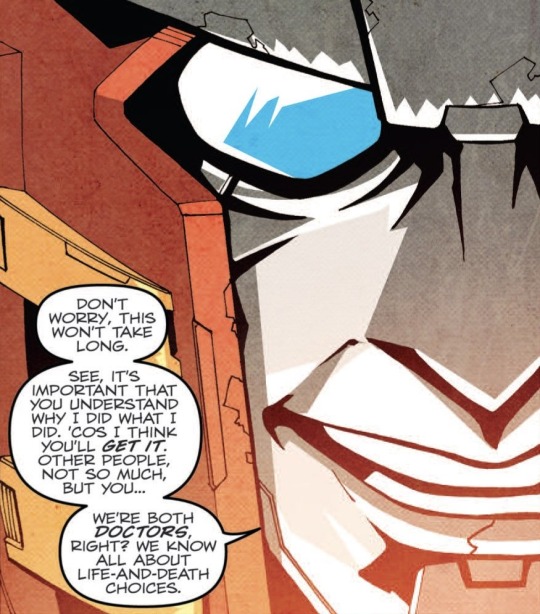
Then there’s the exchange of insults:
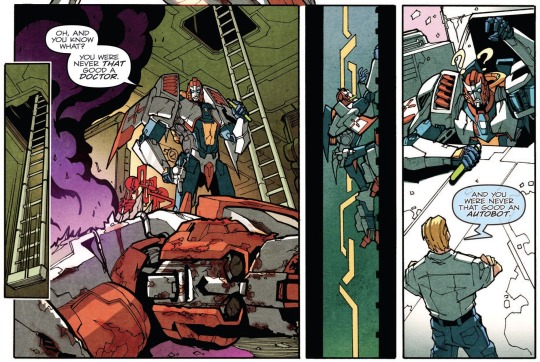
This is what I meant earlier by “true feelings being revealed.” Ratchet may have just been trying to match Pharma’s insult, but it’s unlikely it was merely reciprocal because while Ratchet is snarky at times, he’s sincere in that snark. There’s almost always some truth in his verbal jabs no matter how unserious they seem, and he’s never cruel for cruelty’s sake.
So, if Pharma saw Ratchet as an inferior doctor, and Ratchet saw Pharma as an inferior Autobot…it’s reasonable to assume there was always some deep-rooted competition and conflict preventing them from being super close.
Possible suspicion surrounding Pharma’s conduct as an Autobot paired with a tendency to misjudge the nuances of relationships could explain why Ratchet was so quick to decide Pharma was a lost cause. Maybe Pharma’s actions at Delphi confirmed something from the past that Ratchet had brushed off for whatever reason.
In any case, Ratchet seems to have been largely unaffected by the Pharma he found at Delphi. While leaving Messatine, he emphasizes that he’ll miss Pharma’s talent.

Not “who he used to be.”
Not “what we used to have.”
Just…“his talent.”
Later, on Luna 1, Pharma mentions that he and Ratchet were inseparable, but that could mean a few different things:
Best case scenario: Pharma and Ratchet sought each other out on equal terms.
Worst case scenario: Pharma followed Ratchet around.
Somewhere in the middle: the job forced Pharma and Ratchet to work in close proximity most of the time, and while Pharma intentionally ran into Ratchet more often than necessary, Ratchet also sought out Pharma every now and then.
Whatever the case, working with someone every day doesn’t tell you anything about who they are as a person, and the amount of time spent with someone doesn’t automatically correlate to how deep the relationship is or how well the people know each other. It’s not like either Pharma or Ratchet are shown to be good at expressing their personal feelings outside of extreme circumstances.
Ratchet does bring up late-night conversations of the past:

But while this indicates there was something deeper between him and Pharma, because neither of them were ever shown to be super open with their true feelings, it’s unlikely the conversations were full of touchy-feely talk. In all likelihood, the conversations were mostly medicine and war-related, with the rare spark-to-spark talk sprinkled in. Also, considering everything up to this point, one has to wonder if those talks ever meant anything to Ratchet, or if he was just digging for something that might stall Pharma’s torture.
Maybe those late-night conversations did mean something to Ratchet, but whatever the case, Pharma didn’t take the bait. He knew Ratchet was trying to stall by making an emotional appeal, and perhaps he was convinced the conversations hadn’t meant that much to Ratchet.
Looking at all of this, it’s hard to believe Ratchet ever cared about Pharma as more than an interesting work friend. But even if he had cared more than he let on, it wasn’t enough to overcome the doubts he had about Pharma’s character.
As for whether Pharma truly cared about Ratchet, I’m convinced he did, but in a mostly unhealthy way, and with a strong undercurrent of one-sided rivalry. At some point, Ratchet had been an equal and a source of challenge, and he probably listened to Pharma pretty often. It’s reasonable to assume Ratchet was one of the only people—if not the only person—able to handle Pharma’s intense temperament and challenge him in a meaningful way, providing some semblance of friendship for Pharma.
However, one last thing that stands out is that, when telling Ratchet why he’s torturing him, Pharma didn’t say anything like, “Because you hurt me” or “Because you turned against me—your friend.” Instead, he said it was for “ruining things at Delphi” and because “you declared war on my body.”
Either Pharma wasn’t being entirely honest, or Ratchet’s friendship didn’t mean as much in the first place as he’d previously implied. It’s possible the ‘Because you hurt me’ was implied in “for ruining things back at Delphi,” but why not say it outright? Perhaps it was a fear of vulnerability and admitting there was ever a relational need at all.
At the end of the day, it’s difficult to say for certain how close Pharma and Ratchet were, but it’s clear they were never on the same page and there were always barriers between them.
Luna 1
Revisiting the matter of Pharma’s morality taking a backseat to other priorities, his time on Luna 1 further underscores this. Again, Pharma chooses his battles and is unwilling to put himself at great risk for the sake of others, but a closer look at the situation with Tyrest reveals there wasn’t really anything he could have done for the Cold Construct population even if he had wanted to. It would have been him against Tyrest, an army of Legislators, and a bunch of Decepticons. Pharma knew his limits, and seeing as his goal was self-preservation, it was perfectly rational for him to go along with Tyrest’s grand scheme.
Besides, it doesn’t look like he was given much of a choice:

Although, knowing Pharma, he still would have demanded to know beforehand what he would get in return for the pain, and evidently, Tyrest held up his end of the deal since Pharma had access to the Luna 1 tech collection.
As for Tyrest’s plan to wipe out the Cold Construct population, there’s nothing indicating Pharma’s decision to turn a blind eye to it was rooted in malevolence or bigotry—just rational apathy: ‘I can’t stop Tyrest, so why concern myself with the outcome?’
Again, you can’t save everyone; Pharma had all he could do to save himself.
But it wasn’t all horrible. I would even go so far as to say Pharma found some happiness on Luna 1. Tyrest didn’t care about him, but he didn’t need Tyrest to care. Everyone else there hated him, but he didn’t need to feel like he belonged or was admired. At this point, Pharma’s only interest was Tyrest’s Luna 1 tech collection, and that meant playing nice so he could keep his reward. Back at Delphi, he probably assumed he’d never again practice medicine the way he’d loved; being brought to Luna 1 was an unexpected, yet welcome, second chance.
Even so, Pharma had his moments of cruelty. Back at Delphi, he had easily-identifiable reasons to kill patients—both the ones whose T-cogs he harvested and the 20 more he tried to kill when he shot the life support machine. But on Luna 1, he had no reason to be cruel, yet he chose to be. By this point, he’d mastered the ability to almost completely ignore or subdue his conscience.
In the case of Ratchet’s torment, one could argue Pharma only drew it out for retaliation purposes; it was personal for him.

As for cutting Ambulon in half, it was obviously meant to be as gruesome as possible, yet also quick. But personally, I don’t think it was about Ambulon; it was more about hurting Ratchet. Due to the fact that Ratchet’s identity is wrapped up in his compassion and his ability to be helpful as a doctor, one of the most effective acts of revenge would be to do something that makes him feel utterly helpless.
Also I wonder if, subconsciously or consciously, Pharma was attempting to recreate the sense of helplessness he felt back at Delphi under Tarn’s watch: “Do you see, Ratchet? Do you now understand how it feels to have control ripped out of your hands? To be totally helpless?”
Next, for some reason, Pharma was invested in the promised execution of Getaway and Skids:

He had no personal connection to either of them that would give him a reason to be interested, so maybe Tyrest told him he could perform the execution and/or have the corpses for medical experimentation. Either way, Pharma would have had a chance to use some of the tech in Tyrest’s tech collection, possibly explaining his excitement.
Of course, any chance of an execution disappeared when the final showdown went wrong.
When Pharma tried to escape to Cyberutopia and discovered he couldn’t pass through the spacebridge forcefield, he gave up. He’d been caught; he would no longer have access to Tyrest’s tech collection; Ratchet and every other self-righteous Autobot would never forgive him; and the morality lock prevented him from escaping. By all appearances, he would never again be able to engage in that which gave him a sense of meaning. He had shrunken his world down to his obsessive interest in a specialized field and one significant, yet unrequited relationship. With both of these lost, his world collapsed.
Yes, guilt played a part in Pharma’s despondency, but because he seems to have been in denial of said guilt, it’s more likely his despair was primarily due to the fact that he saw no future for himself. He had nothing left to live for.
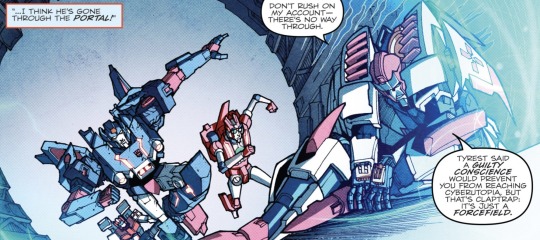
In light of this, Pharma’s flippant comments to First Aid make sense. He wasn’t being insensitive as much as he was goading First Aid. Pharma’s not stupid. First Aid had a massive rotary cannon on him, and Pharma knew exactly which emotional buttons to push to get him to pull the trigger.
Pharma wanted to die.
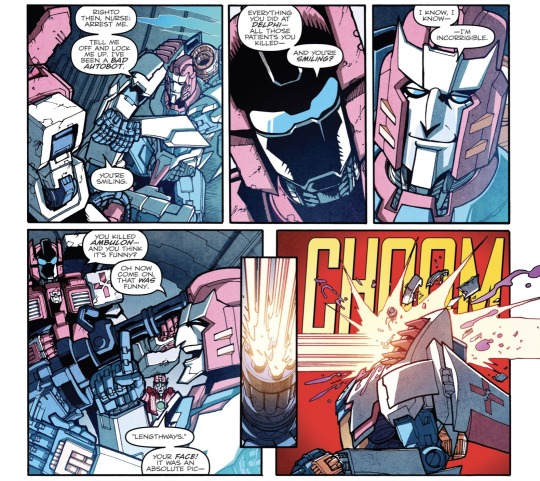
Adaptus
First, let me emphasize that Adaptus did not take possession of Pharma’s body. Instead, Pharma was the unwelcome guest:
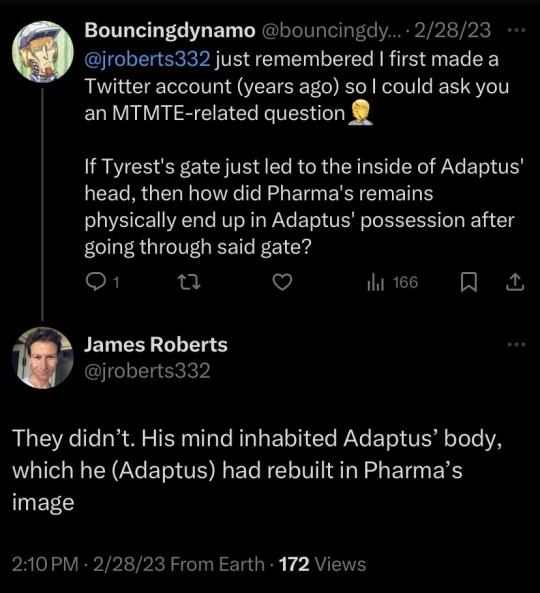
How Pharma ended up in Adaptus’ new body is a mystery, but whatever the case, Pharma didn’t pass on to the Allspark. Whether or not he had a choice can only be speculated.
First Aid had blasted Pharma’s head clean off, so whatever happened must have been related to the spark. Perhaps some residual spark energy was trapped in a body part that Adaptus repurposed, leaving Pharma tethered to the new body unwillingly.
Still, Pharma managed to assert his will and override Adaptus for a brief moment. Considering Adaptus was basically a god, this is impressive.
Based on Adaptus’ surprise at being interrupted, it seems he didn’t know Pharma was there. Why Pharma hadn’t tried to assert himself sooner is a mystery. Maybe Adaptus’ scheme was entertaining; maybe Pharma actually liked the company; or maybe he’d been waiting for an opportunity to get revenge on Tyrest for everything done to him back at Luna 1.
Sure enough, just like with Ratchet back on Luna 1, Pharma’s vengeful streak came out as soon as there was an opportunity.
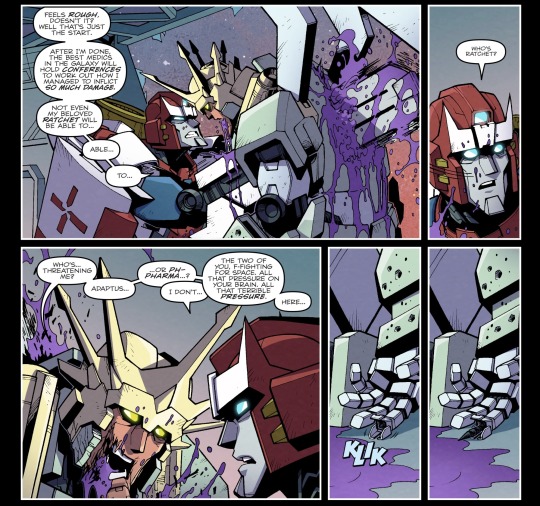
Unfortunately for him, this left him vulnerable, and Tyrest took advantage of the confusion:
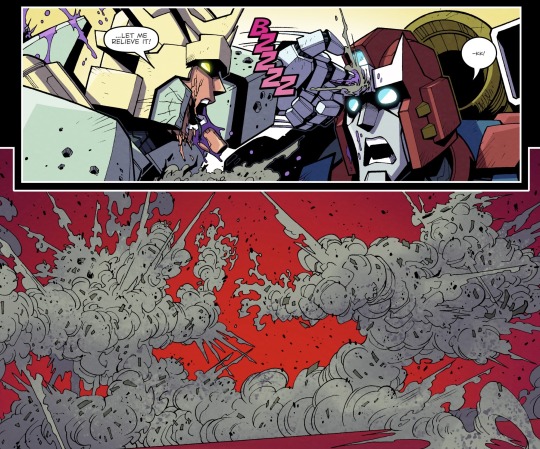
Conclusion
When someone reduces their world to narrow personal interests and one or a few very special people, their grip tightens around what little they have. They often become obsessive and possessive of the few things that make them feel alive, and their view of the world becomes increasingly more subjective and detached from the outside world. Pharma seems to have fallen into this trap.
Even so, in the context of the circumstances, several of the decisions he made were rational—even if coldly so. Oftentimes, “extreme” rationality and self-preservation are villainized in fiction, and characters like Pharma who don’t automatically put themselves at great risk for anyone and everyone are villainized, or at least looked down on. Their choices are often regarded as less human, but rationality and self-preservation are just as human as compassion and self-sacrifice.
Ultimately, Pharma was trapped and pushed over the edge into “insanity” by Tarn’s cruelty, but his own choices made from a place of pride determined how he fell, and how far he fell. It was a perfect storm of Tarn’s mind games and Pharma’s intellectual arrogance, excessive self-confidence, obsessive nature, and stubborn grip on the kind of future he wanted for himself.
Pharma is yet another Icarus who flew too close to the sun and paid dearly for it, and while JRO/the narrative could have given this Icarus better wings, that doesn’t change the fact that he chose to fly so high.
***
Many thanks to anyone who made it to the end of this monster of a post.
-tosses a Rodimus Star at you-
#idw transformers#idw1#maccadam#MTMTE#lost light#idw pharma#pharma#tf idw character analysis#tf idw meta#dr. fancy hands#nova’s nerding out again
749 notes
·
View notes
Text
The Best News of Last Week
1. A branch of the flu family tree has died and won't be included in future US vaccines
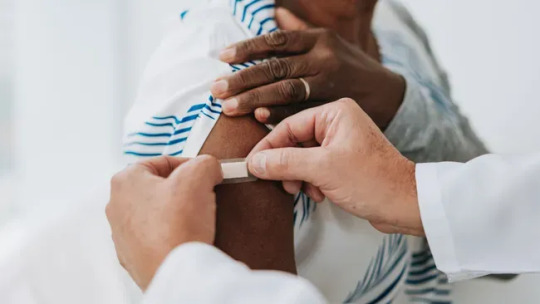
A type of flu virus that used to sicken people every year hasn't been spotted anywhere on Earth since March 2020. As such, experts have advised that the apparently extinct viruses be removed from next year's flu vaccines.
The now-extinct viruses were a branch of the influenza B family tree known as the Yamagata lineage. Scientists first reported the apparent disappearance of Yamagata viruses in 2021.
2. Hospitals must obtain written consent for pelvic and similar exams, the federal government says
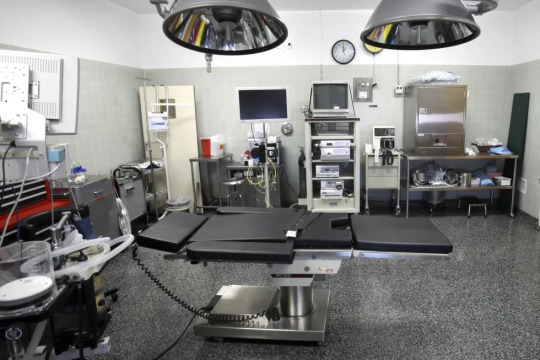
Hospitals must obtain written informed consent from patients before subjecting them to pelvic exams and exams of other sensitive areas — especially if an exam will be done while the patient is unconscious, the federal government said Monday.
New guidance from the U.S. Department of Health and Human Services now requires consent for breast, pelvic, prostate and rectal exams for “educational and training purposes” performed by medical students, nurse practitioners or physician assistants.
3. Germany approves new law that will allow adults to carry up to 25 grams of cannabis for their own consumption and store up to 50 grams at home.
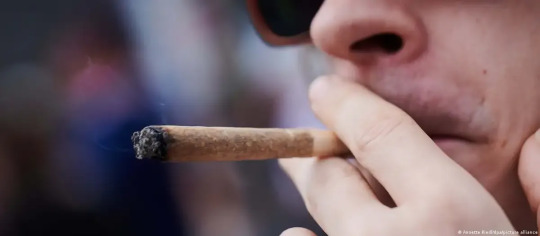
Germany's upper house, the Bundesrat, cleared the way to partially legalize cannabis on Friday. Adults aged 18 and over will be allowed to carry up to 25 grams of cannabis for their own consumption.
4. Tick-killing pill shows promising results in human trial | Should it pan out, the pill would be a new weapon against Lyme disease.

Tarsus Pharmaceuticals is developing a pill for humans that could provide protection against the tick-borne disease for several weeks at a time. In February, the Irvine, California–based biotech company announced results from a small, early-stage trial showing that 24 hours after taking the drug, it can kill ticks on people, with the effects lasting for up to 30 days.
5. Thailand moves to legalise same-sex marriage

Thailand has taken a historic step closer to marriage equality after the lower house passed a bill giving legal recognition to same-sex marriage.
It still needs approval from the Senate and royal endorsement to become law but it is widely expected to happen by the end of 2024, making Thailand the only South East Asian country to recognise same-sex unions.
6. French Revolution: Cyclists Now Outnumber Motorists In Paris
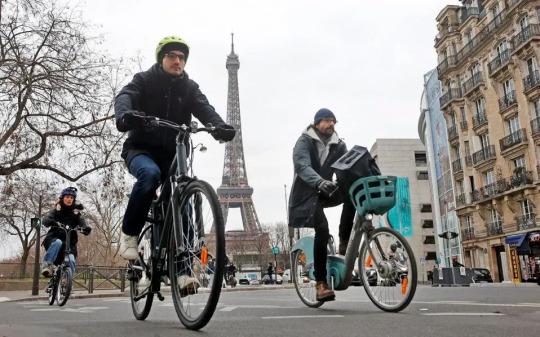
Official measurements have found that Paris is rapidly becoming a city of transportation cyclists. In the suburbs, where public transit is less dense, transport by car was found to be the main form of mobility. But for journeys from the outskirts of Paris to the center, the number of cyclists now far exceeds the number of motorists, a huge change from just five years ago.
7. 'Miracle' operation reverses blindness in three-year-old girl giving her 'promising' future

A three year old with a genetic condition that causes blindness is doing incredibly well after unique pioneering operation to restore her sight.
The UK is the only country performing keyhole eye surgery to inject healthy copies of a gene into sufferers’ eyes. It is being used to reverse blindness in children born with a rare condition which means they can only distinguish between light and dark. And it has given little Khadijah Chaudhry, born with Leber congenital amaurosis-4, a chance at seeing properly again.
---
That's it for this week :)
This newsletter will always be free. If you liked this post you can support me with a small kofi donation here:
Buy me a coffee ❤️
Also don’t forget to reblog this post with your friends.
850 notes
·
View notes
Text
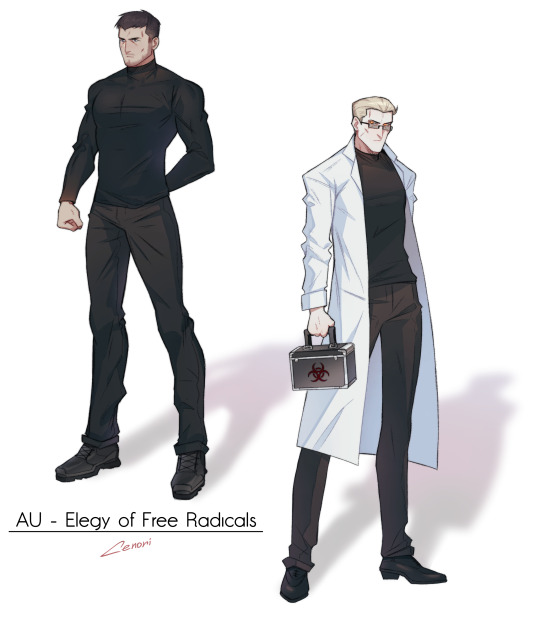
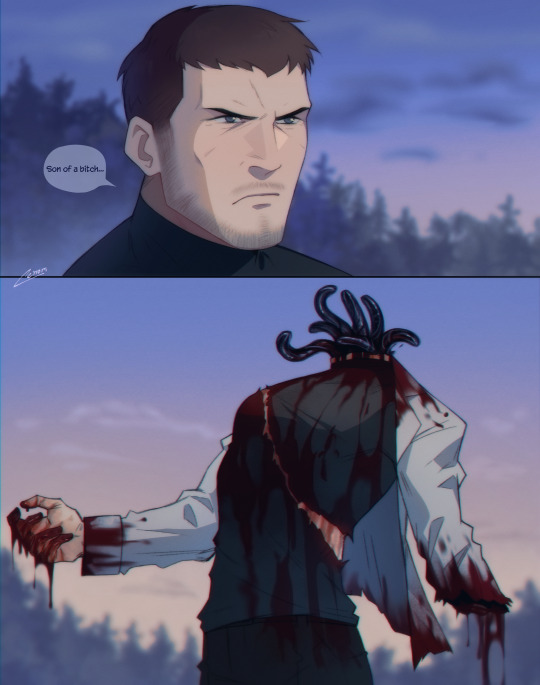
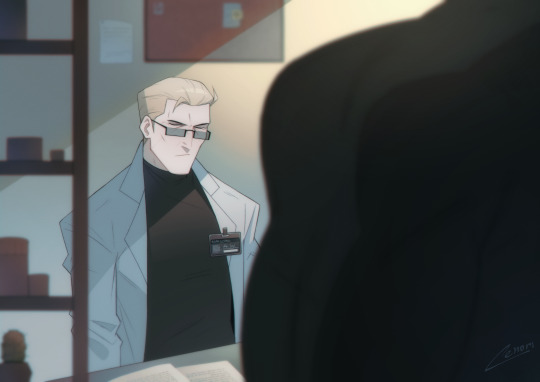
In 2021, dirty secrets about the use of bioweapons are revealed inside BSAA + there are direct hints in Umbrella Corps that Wesker is alive. I just combine the two puzzle pieces together in my head. So let's look at another interesting post-2009 scenario.
AU - ELEGY OF FREE RADICALS
Chris was once careless about eliminating Wesker. Knowing his nature, he still didn't check Wesker's presumed place of death properly. Relying on his own luck, Chris left the place of battle and never returned there. But he had to go back. It has become his mistake.
Chris reported the scene of the victory to the BSAA. Rotten BSAA could have used that data in any way they wanted. Like going back there and checking out the volcano. They could have indicated on the documents that they were headed to clear the area of the remnants of Uroboros, but in fact to search for Wesker's remains to get rich off the sale and study of his unique biomaterial. But what they didn't expect was to find him alive. Badly injured, helpless, but somehow alive.
Taking advantage of the weakness of the still living organism, he was taken to the secret laboratory of the headquarters. Now Wesker could be under the supervision of BSAA scientists for a very long time. He's much more useful alive than dead. His knowledge, skills, all of it could be utilized. And it was also possible to conduct endless experiments on his unusual body... Testing the limits of his abilities, testing various poisons, looking at the lethality of their new weapons, and etc. He was once again a puppet, as he had once been in Spencer's hands, from which he had miraculously escaped.
The BSAA kept Wesker's abilities under strict control, he was trivially stripped of any PG67A/W injections, replaced with an alternative that was only necessary for his body to regenerate damage after the battle in the volcano, but didn't provide any additional benefits. So he would remain weak but healthy.
Another remedy was also applied to him, eliminating the consequences of merging with the Uroboros, which modified his body in a volcano. It was discovered in 2011, after the events of Revelations 2. It was rude to call it just a serum, it was something more, because it did not remove the virus itself from the body, but brought it into a more stable form, allowing Wesker to take his ordinary appearance. With him, in this form, it became easier for employees to work.
The BSAA restored Wesker, stripped of his strength, any dignity, as well as his freedom. He was bedridden for several years and various weapons were tested on him, then recorded how his body reacted and at what rate it recovered. An immobilized lab rat, a deserved punishment for someone like him? Perhaps. It was thanks to his "sacrifice" that the anti-regeneration weapon was invented, which had once come in handy for Chris in the battle against Mold.
Just think… how many things could the BSAA have invented using the infinite resources of Wesker's body? He was terrified of these thoughts. Terror at the realization that he had no chance of escape, that he was trapped here forever, that he would continue to have his organs taken out of him and be forced into endless pain. He reflected that he hadn't actually managed to do so many contradictory things to deserve eternal torment. And it's better to let him die than to endure this hell. But his own body played a cruel joke without dying. It was an expert on regeneration. His pride was trampled when he begged for death.
BSAA absolutely did not spend any painkillers and sleeping pills on Wesker, absolutely all experiments were carried out when he was conscious. They had already spent a lot of money on him during his recovery, it was a waste to spend even more on someone who could repair any of his damage.
Pain and terror haunted him for six years. He cursed what he used to idolize in himself.
And then he was forced to work for them. In 6 years he had grown accustomed to the constant pain and had already learned to see himself as nothing, sending his consciousness into free floating. Deep in his thoughts, he created a place where he learned to ignore the endless physical torment. But when he was put on his feet and pulled out of this place… Wesker was even more devastated.
It was unusual for him to suddenly return to normal work, all this created a mess in his head, reality seemed to be nonsense. The usual paperwork after hell? Are you kidding me?!
Morally, he was destroyed. His psyche was severely damaged. Wesker from the "torture room" was locked in a cell that looked like a combination of a room and a laboratory. For fear of being put back on the operating table again, he dutifully began to work and develop various things that BSAA would use in the future. But it wasn't life either. Weakened body, lack of abilities... he wanted to die, but he couldn't afford it, because he was practically immortal. Although, even if he used a weapon that stops regeneration on himself... he still wouldn't kill himself.
«Not here»
«Not like this»
At times he thought he was balancing on the fine line between normalcy and insanity. He saw people at best once every two weeks who came to check on his work and were not at all talkative. Wesker had always been convinced he didn't need company, but 12 years without socializing had made him question his beliefs.
Once a month he was provided with food, and then carelessly, because he didn't need food. His body, experiencing hunger, could devour itself and regenerate immediately.
The only reason he was given a room and released from the operating table was because the organization wanted to see what he could offer them. Of course, they didn't stop studying his unusual body and conducting experiments, but Wesker was already in charge of the process himself. Independently amputated his limbs and so on. Only closer to 2019 were these experiments stopped, because they had extracted all possible benefits from his body.
Wesker remotely, horrified, realized that thanks to his body he would live much longer than the average person, if not forever. Which led him to believe that he would be kept in this cage for centuries. BSAA would close, others would take their place, find him, torture him again. And so on in a circle, for all eternity, as long as human society and greed existed. This had to end... but how? A plan was needed, a complex one that could not be unraveled.
His life and existence was a BSAA mystery from 2009-2021. For 12 long years he was not allowed out of the walls of this cell.
Of course he wanted to escape, he had many unrealistic thoughts in his head about it. He was also interested in meeting Chris, aged, changed. To see his reaction, genuine shock rather than the anger he'd reacted to Wesker's earlier 'resurrections'. Is Chris even still alive today? What year is it now?
But this life couldn't go on forever, the BSAA was cracking at the seams. In 2021 it was revealed that they were using B.O.W. soldiers, something Chris couldn't ignore. So he headed over to European headquarters to deal with it - right where his nemesis was located, a complete headache. Chris couldn't accept that his organization, which was fighting biological weapons, would use them. It didn't fit in his head. He had long ago stopped trusting the BSAA, but this was the last straw.
Arriving there, Chris did not expect to meet someone in the basement laboratories whom he had buried a long time ago.
What was he going to do with him? Shoot him in the head without any thought? That would have been logical and in Redfield's character, but over the years he'd stopped being a complete hothead, learned to think first and then act. Gained a little equanimity.
It will turn out that it was Wesker who was involved in the creation of the B.O.W. in BSAA. Especially since these soldiers are improved clones of Chris himself. Who else could have come up with such an idea? Only to a man who thought Chris was "one of his best men".
For the past 6 years, Wesker has been forced to be an advisor to BSAA, sharing all the knowledge and ideas. He might have been able to pull it all off, if only to get back at that organization, turning Chris' anger on it, and turning his attention to himself at the same time. After all, only this "one of his best men" was the only one who could save him. Yes, Wesker was pathetic. He felt he wasn't even worthy of his former name, being so pathetic as to enlist the help of his enemy. But it was the only option. There was no more talk of pride.
However, it didn't matter now, Chris had come here to punish the founders, so their prisoner, their chief counselor, might prove to be the best informant. And an ally.
Natural intuition made Chris believe his former enemy, the biggest manipulator of them all. As if he was definitely not lying now, because he was in such a big asshole that he couldn't let his words sound unconvincing. Earlier, Chris would have easily recognized his lies, but not now. Right now, completely honest and dull eyes were looking at him from beneath translucent glasses. So damn pitiful that Chris automatically assumed the role of the hero rescuing the damsel in distress.
Chris was quickly combine the information together in his head: the situation, the physique, the setting... His opponent had been held hostage by his own ambition, it couldn't help but bring a smile to Redfield's face. But he hid it in his thoughts, because he deemed it inappropriate once he read Wesker's imprisonment papers. Chris had some free time to devote to the situation.
He read about what had been done to Wesker. About all the torture. And Redfield clutched his head, when he got to the description of his ammunition that he'd used against Mold a couple years ago. He was terrified that this weapon had been created in such a gruesome way... through the suffering of his enemy, who, even considering all his guilt, didn't deserve all this. Chris felt that Wesker should have died and rid the world of himself rather than suffer endlessly. Even for him, he thought it was inhumane.
The first thing Wesker said to Chris was: - Now you've taken on the role of captain of the «alpha» too. This jabbed Chris slightly, but he noticed how the hostage said it without malice. Redfield involuntarily remembered 1998, the mansion, the betrayal, the deaths of the Alpha and Bravo group...
The compartment Wesker was in was to him both an office and a laboratory, and a room. A kind of prison, which he could not leave on his own because of his weak physical condition. He was weakened by the daily injections putting his viruses inside his body to sleep.
Releasing him and examining him at arm's length, Chris made sure that in the state Wesker was in now, he posed no danger, just an ordinary disgust. He resembled only a pale copy of his former self.
The BSAA operative dragged him carelessly behind him like some sack of garbage, concerned only with keeping the information in his head intact. But in his mind Chris still held images of what the BSAA bastards were doing here to Wesker. He didn't want to feel sorry for him, but he couldn't control it, Redfield had never been heartless. Initially he had only cared about information, but it wasn't long before he didn't even notice how protective he had become of him. As if a friend, which in truth, he never was. His captive's behavior was different from what Chris remembered. It was different, like a throwback to the past. Perhaps 12 years of imprisonment had had that effect on him.
He was docile, which wasn't surprising, since Wesker had been treated like an object by the organization, and the operating table had been a good teaching moment. Chris couldn't believe that after so many years of hell his former enemy's mind was still intact, that he hadn't lost his mind and was capable of dialog.
Time passed unnoticed during the proceedings with the BSAA about B.O.W., eventually the organization was destroyed and all its equipment, along with Chris's squad, transferred to TerraSave.
Chris during all of this had to sign Wesker into the Hound Wolf Squad as either a prisoner or an advisor. To keep him from getting shut down again, that was the deal. He helps them, they help him. Over time, he was getting back to normal. The food and good company had done their job.
However, Chris didn't know that his new ally hadn't lost all of his strength, and the ones he had were sleeping under the influence of the medicament. But time passed, the medicament slowly stopped working without new doses, and Wesker understood it perfectly well. And felt it. It didn't affect his appearance, so he could play his role for as long as he wanted. But was it a role? Sure he was portraying a courtesy that annoyed Chris to the point of nausea, but it was partially sincere. Having broken with his past at the fault of the BSAA, Wesker could only hope to find a new purpose. After all, as Spencer had raised him, there is no life without purpose.
Therefore, was it so necessary for him to betray Hound Wolf Squad? Would it be beneficial to him? Chris is a strong point. He has no doubt that if he kills Redfield - another will take his place, and will definitely get him into the basement wheel of samsara. So Wesker had no grand plans yet. After all, any of them would be doomed to failure as long as there was anyone in the world capable of resisting.
But Chris risked to give him a goal, which, however, called impossible - to become the best version of himself. To help the Hound Wolf Squad, to work with TerraSave, to use his knowledge for something other than endless failed experiments. Stop being Spencer's failed experiment. The only option Chris would give him a chance at.
Those words stuck in Wesker's head for a long time. Mentioning the old man was like a low blow. Chris knew where it hurt the most.
It had been several years since Wesker had joined Redfield's team. All that time he'd been hiding his abilities so as not to lose the fragile trust in his person. But the truth couldn't help but surface one day....
On one of the missions connected with B.O.W., the blade of an exploding helicopter blew off Wesker's head, and then another piece of debris cut his body in half.
But he didn't die.
Chris was enraged. With resentment, he felt cheated. What else could he have expected?
First, the black mass connected the body, restoring functionality to it, and then this silent carcass picked up the head. It was slow. It looked helpless and creepy. Chris's squad was on edge, but he ordered to wait. The black substance emerged from the base of the neck and attached the head to itself, then the calm expression on the reanimated head changed to horror. Was he in unbearable pain from the newly received oxygen? Or from the fusion of tendons?
When Wesker recovered, he couldn't at first think of a response to Chris' "explain yourself!"
Everyone's fragile trust collapsed, but not Redfield's, for he knew that if his former adversary had wanted to betray him, he would have betrayed him long ago, he wouldn't have let himself be so ridiculously exposed. Especially after all the torture he'd endured. Chris could understand why Wesker was hiding his powers. Redfield had stepped on the same rake of trust again, convincing himself that he had everything under control.
Wesker, ever since the prototype had merged with Uroboros in his body, had acquired a number of flaws, chief among them an unbearable sensitivity to pain. The only time he could not feel pain was when he was BSAA injected with force restraining drugs. But without them, all the disadvantages came out.
Whereas before he could recover from any wound without feeling anything but minor damage, now the pain was so obvious that every regeneration was accompanied by agony. Especially if it was a burn, for heat is a major weakness for Uroboros. The healing places on his body, after that helicopter situation, hurt like hell.
He was closer to human now than he had been before, and Chris seemed to realize that. That was why he hadn't killed him a second time, but had accepted him back into his squad. It was not only a gesture of goodwill, but also a precaution, a way to keep a dangerous object as close to him as possible so he wouldn't do anything.
How long will they have to cut off the heads of hydra in the face of the creators of bioweapons?
- Why do you trust me, Chris?
- I still believe that anyone can become the best version of themselves. We should prioritize fighting for the future to give someone a quiet life that you and I have been robbed of. I know about Project W. Together we can stop new organizations and prevent many tragedies like this from happening again. And you can help us, Wesker. BSAA took away your choice, but I'm giving it to you now.
Wesker at first couldn't find the words to respond, but after a moment he barely audibly whispered: "Thank you."
From a man who never thanked anyone, Chris was shocked to hear that. And he was proud of him. Had he forgiven him? No, his deeds were unforgivable. But Chris wasn't the kind of man who would turn his back on his one chance to make things right, to make things right on Earth, to save someone's life. In this truce, he sees a future that's bright for everyone.
883 notes
·
View notes
Text
Until last week, the future of vaccination for human papillomavirus, or HPV, in the United States seemed clear.
For several years, a growing body of evidence has suggested that just a single dose of the vaccine may be as effective as two are, offering decades of protection against the virus, which is estimated to cause roughly 700,000 cases of cancer each year. More than 50 other countries have already adopted the one-dose schedule, and many experts hoped that the United States might follow suit this year.
The decision rests, primarily, on the deliberations of the Advisory Committee on Immunization Practices, a vaccine-advisory committee to the CDC. ACIP was initially expected to put to a vote, as early as next week, the questions of HPV-vaccine dosing and, simultaneously, whether to strengthen the recommendations that advise vaccination starting at 9 years of age. Several experts told me that they had tentatively expected both motions to pass, making HPV vaccination easier, cheaper, and quicker. The HPV vaccine is one of the most powerful vaccines ever developed: It is unusual among immunizations in that it durably prevents infection and disease at rates close to 100 percent. If it was deployed more widely, “we could see the end of cervical cancer,” Kirthini Muralidharan, a global-health expert and HPV-vaccine researcher at the Johns Hopkins Bloomberg School of Public Health, told me.
That was before Robert F. Kennedy Jr., the nation’s health secretary, abruptly dismissed all 17 members of ACIP. Among their replacements—each apparently handpicked by Kennedy—are several researchers who have spread misinformation about vaccines or been embroiled in litigation against vaccine manufacturers; at least one of the new members has exaggerated the harms of the HPV vaccine specifically. Now the anticipated votes on the vaccine, among other immunizations, have been removed from the proposed agenda for ACIP’s coming meeting, leaving the fate of the vaccine far murkier.
ACIP has, for decades, been one of the world’s most respected expert panels on vaccines. The group’s charter is to rigorously evaluate the evidence on the immunizations that the FDA has green-lighted. The advice it gives the CDC then helps devise the official immunization schedule that guides how insurers cover vaccines, how states mandate immunizations in schools, and how primary-care physicians advise their patients. Only under the rarest of circumstances has a CDC director rejected the committee’s advice. Effectively, the members of ACIP “decide who gets the vaccine, at what age, and how many doses,” Noel Brewer, a vaccine expert and health-behavior researcher at UNC Gillings School of Global Public Health, who served on ACIP until last week, told me.
The group’s rigorous, data-driven approach is a primary reason the HPV-dosing strategy has yet to change. In particular, the committee was awaiting formal results from a large clinical trial in Costa Rica that has been comparing dosing strategies in adolescent girls. So far, the data, recently presented at a cancer conference, suggest that one dose is just as effective as two, the current CDC-backed regimen. Earlier this year, the ACIP working group focused on HPV vaccines was leaning toward supporting the dose drop, Brewer, who was part of that group, told me. The proposal to routinely recommend the vaccine as early as 9 years of age, he added, seemed likely to pass, too. (Currently, the CDC allows for HPV vaccination as early as 9 years of age, but only actively recommends it starting at 11 years of age.)
Those amendments to HPV-vaccination guidelines would make the shot simpler to get, for a wider range of children—which could dramatically increase its uptake, Gretchen Chapman, a health-psychology researcher at Carnegie Mellon University, told me: “The more you can make getting vaccinated easy and convenient, the higher vaccination rates will be.” Only about 60 percent of 13-to-17-year-olds in the U.S. are up-to-date on their HPV shots—a gap that public-health experts consider a major missed opportunity. That the shot can almost perfectly prevent infection and disease for decades is “like the fantasy we have of vaccines,” Brewer told me. Its rock-solid protection “just keeps rolling.”
But the new ACIP may see matters differently. Kennedy has yet to fill the committee’s roster, but his initial picks include individuals who appear to have a beef with HPV immunization. One member, Vicky Pebsworth, co-wrote an analysis detailing adverse events following HPV vaccination for an anti-vaccine organization, which she serves on the board of. Another new member, Martin Kulldorff, provided expert testimony in cases against the drugmaker Merck over its Gardasil vaccine, the only HPV shot available in the U.S., and received thousands of dollars from plaintiffs who accused the company of downplaying the vaccine’s risks. (A judge in North Carolina overseeing one of those cases ruled in favor of Merck; another, in Los Angeles, is going to trial later this year.) And Kennedy, an environmental lawyer, has himself been instrumental in organizing the litigation campaign against Merck—and has described Gardasil as “the most dangerous vaccine ever invented.” (Under pressure from senators, Kennedy has said that he will relinquish any proceeds from these lawsuits to his son.) He has also falsely claimed that the HPV vaccine—which data show has dramatically reduced rates of cervical cancer in the U.S. and elsewhere—“actually increases the risk of cervical cancer.” (HHS, the CDC, Pebsworth, and Kulldorff did not respond to a request for comment.)
At some point, the current ACIP might see fit to soften the existing guidelines, or even advise the CDC to remove the vaccine recommendations for certain groups. If it does, those decisions could prompt insurers to stop covering the vaccines, or disincentivize health-care providers from offering them to families. The committee could also remove the vaccine from the Vaccines for Children program, which provides shots to kids whose parents cannot afford them. (An initial agenda for the ACIP meeting scheduled to start on Wednesday initially included a recommendation vote for the HPV vaccine, as well as a vote on its status in Vaccines for Children; those items no longer appear in the CDC’s draft agenda.)
A few of the experts I spoke with raised the possibility that this new ACIP might still amend the HPV-vaccine recommendation to a single dose, but with a different rationale: not because the members are swayed by the data on its effectiveness, but because they’d support any option that cleaves a vaccine dose from the immunization schedule. Kennedy, too, seems likely to back such a move. “Any window to roll back the number of times a child receives a vaccine injection, he’s going to push for,” Alison Buttenheim, a behavioral scientist at Penn Nursing, told me.
The net effect might at first seem the same: Fewer doses of the HPV vaccine would be on the schedule. But the reasoning behind a decision can matter just as much as the end result. Robert Bednarczyk, an epidemiologist and vaccine researcher at Emory University’s Rollins School of Public Health, noted that, although much of the evidence so far has pointed toward one dose being enough, the case isn’t yet a slam dunk: Some of the trials investigating the single-dose strategy are using different formulations of Gardasil, or non-Gardasil brands, which may perform differently. (The Costa Rica trial, notably, does include the same Gardasil recipe used in the U.S.) And some experts still wonder if the protection offered by a single shot may fade faster than a double-dose regimen—a more challenging aspect of vaccine protection to assess without many years of follow-up. If that’s the case, prematurely dropping the second dose could later force the U.S. to add a shot back into the vaccine schedule—a confusing message that could erode trust. The last thing the country needs now is “another hit to public confidence around vaccines,” Bednarczyk said.
How Kennedy and his allies publicly justify these choices, then, matters quite a bit. Vaccines, on the whole, are now being billed by the government not as vital, lifesaving tools, but as unnecessary risks, deserving of additional scrutiny. Of the multitude of vaccines on the childhood-immunization schedule, many people already see HPV “as the troublesome one,” Brewer told me. Its ability to prevent cancer has been underemphasized; some critics have stoked unfounded fears that, because the vaccine guards against a sexually transmitted virus, it will increase promiscuity. And unlike other vaccines recommended in the early adolescent years, such as the meningococcal vaccine and the Tdap booster—which are required by most or all states for entry into secondary school—HPV is mandated for preteens in only a handful of jurisdictions.
All of these pressures make the vaccine more vulnerable to being rejected, Chapman told me. And should Kennedy’s new vaccine team openly discard HPV doses primarily for the sake of dropping a shot, that could set a precedent—for removing other vaccines from the schedule, in part or entirely.
17 notes
·
View notes
Text
Also preserved in our archive
"No one's getting vaccinated, but let's not even mention masks or air filters :) Low vax rates = ¯\_(ツ)_/¯ "
Not a bad article, it's just the lack of anything besides hoping millions of people will rush out for a vaccine right now that's driving me insane: If people don't want to vax 1. give them alternatives 2. remove barriers such as cost so they might change their minds easier 3. clean the air 4. inform people about the risk instead of changing the community levels again (looking at you, CDC).
By Brandelyn Clark
As COVID-19 is expected to surge this winter, communities across the Southwest face rising hospitalizations and new, resilient variants. Infection rates can be even more severe for marginalized populations in these states.
Limited health-care access and historically low vaccination rates amplify the burden on these communities and underscore long-standing health disparities. Following a summer surge, this new wave serves as a stark reminder of how these inequities continue to put vulnerable groups at greater risk.
The Los Angeles County Department of Public Health is deploying mobile vaccine clinics to bring updated Moderna and Pfizer shots directly to high-risk areas.
Meanwhile, the Latino Coalition for a Healthy California (LCHC) continues to lead efforts on the ground through its network of “promotores” for Latino and Indigenous individuals. These community health workers help increase vaccination rates and provide essential health education.
Mar Velez, LCHS director of policy, spoke about the high stakes for families in these vulnerable areas.
“At the height of the pandemic, a lot of Latino and Indigenous workers were still going into work, still having to go in person. … Many of us are the sole provider of our families, and so we need to show up to work. It’s very much a similar situation now where folks are going into work, facing person-to-person interactions, and those infections are impacting us disproportionately,” Velez said. “We’re the ones that are out there on the front lines. The likelihood of us becoming infected is that much greater. We don’t have the luxury of staying at home.”
Several factors are expected to drive a winter surge in the Southwest, including the circulation of new variants like KP.2 and KP.3. Though more contagious, they are not particularly severe.
The week of August 10, the percentage of U.S. individuals testing positive for the virus reached its highest point since January 2022, according to the Centers for Disease Control and Prevention.
Cases, emergency department visits and hospitalizations for COVID-19 are currently declining nationally, with a positivity rate of 3.8% in California, Arizona and Nevada on November 9.
The CDC’s epidemic trend modeling suggests that COVID-19 cases are likely increasing in California and Arizona. These trends are based on data from emergency department visits and provide insights into whether infections are growing or declining at the state level.
Though death rates are down, experts say the statistics are still alarming and that in marginalized communities, the illness never really left.
“Latino and Indigenous communities are still feeling the impacts and the consequences of the pandemic. … Those infections and hospitalizations that are happening now are impacting communities of color, Latino … and Indigenous communities disproportionately,” Velez said.
Health disparities in marginalized communities are rooted in systemic factors such as discrimination and unequal access to social resources such as housing, education and employment. These inequalities lead to higher rates of chronic diseases and limited health-care access, while cultural, language and trust barriers worsen the challenges.
To address these disparities, the county public health department’s Mobile Vaccine Team organizes pop-up clinics in areas of “high need, prioritizing seniors, people experiencing homelessness, and those without health insurance,” according to a media representative from the county.
Between October and December last year, the team facilitated 3,643 events and administered over 31,000 vaccine doses at no cost. This year, 338 free mobile vaccine events are scheduled, along with in-home appointments for residents who are unable to visit vaccination sites.
Additionally, the county offered back-to-school clinics in underserved areas to provide updated COVID-19 and flu shots.
Arcenio López is the executive director of the Mixteco/Indígena Community Organizing Project (MICOP). The organization provides essential services and works closely with marginalized communities, including migrant populations.
He highlighted the longstanding funding disparities community-based organizations face. These groups, which have long advocated for financial support for programs that serve marginalized communities, often see funding only in response to crises like the COVID-19 pandemic.
“For years, we’ve been saying there’s these organizations who need financial support to develop programs, to do these initiatives, to do outreach and education. Those CBOs (community-based organizations), nonprofit organizations and groups that are doing the work are always the last to receive funding,” López said. “When we (ask for) government grants, they say there is no money. But, interestingly, when COVID happened, everyone was trying to send money to organizations.”
Marginalized communities often struggle with distrust toward outsiders, particularly in health-care settings. This mistrust, heightened during the pandemic, created challenges for health initiatives. Many hesitated to engage with health services due to a history of exploitation and communication barriers.
López’s and Velez’s organizations address this by relying on trusted community members who share the same language and experiences as the people they serve.
These peer-to-peer models have proven effective in overcoming resistance and improving receptivity to health initiatives, particularly vaccinations, by cultivating trust in a way outsiders cannot.
A study by LA-based nonprofit Cedars-Sinai found that COVID-19 vaccinations significantly reduced disparities in disease incidence between low- and high-income communities in Los Angeles. Although lower-income communities initially had lower vaccination rates, the impact of vaccination was more significant and helped reduce income-related disparities.
“Everything we do at LCHC is informed by and requires community participation. … Without the participation of our communities, then it’s not as effective,” Velez said. “Policy work is never perfect, but it’s even less perfect if we don’t have impacted voices at the table. We cannot design policy solutions without the participation of our community because we often … get it wrong (or) we’re not able to address the issues that are most important to our communities. It is at the heart of what we do.”
#mask up#public health#pandemic#wear a mask#covid#wear a respirator#covid 19#still coviding#coronavirus#sars cov 2
30 notes
·
View notes
Text
WHY BICKSLOW IS HORRIBLE
In the Fairy Tail Canon, Bickslow Is the clear antagonist, yet people still seem to justify his actions and say that he belongs in the Fairy Tail guild despite this (mostly Macao, but we all know why that is). But in my essay I’m going to explain to you why you should hate bickslow and how he really isnt one of those cool villain characters that people justify because they’re cool (shadow the hedgehog). From his many many crimes to how he’s almost caused the worlds end in the Fairy Tail Canon.

This clearly shows that bickslow STOLE Stings jacket and tore it apart to make some pathetic cloak that doesn’t even go all the way down. He does NOT pull that look as well, making it even more of a crime. Whats WORSE is the fact that THAT JACKET is ROGUES FAVOURITE. Sting wasn’t more then mildly annoyed by the loss of his jacket, but ROGUE LOVED IT. Sting only really wore it because rogue liked it. Even though he’s had it for 10 years and its waay too small for him (sting had the sleeves stretched to fit his arms, he really didn’t want to reveal that much shoulder but it was for rogues sake). If this hasn’t at the very least planted a seed of doubt in your mind, then CLEARLY you need to refer to my stingue essay.
Following this point, we’ve now got our first piece of evidence that Bickslow is evil, we can move onto the next related point. Bickslow HATES STINGUE. It’s not clear for first time viewers but for a veteran and expert like me, it’s very clear to see. In one of the most commonly referred to Stingue panels during the Dark Destiny Arc, (or at least it would have been if bickslow weren’t there), Rogue and Sting are teaming up to fight the morally complex Levia and the other dragon that probably didn’t actually show up to the battle, when BICKSLOW (more like badslow) THIRD WHEELED THEIR DRAGON KILLING DATE.

This is incredibly evil, the two main characters of the series were having an iconic moment when BICKSTUPID came in and RUINED It by trying to finish stings sentence and ending up making absolutely no sense at all. And this was clearly malicious, bickslow could’ve probably smelled the romance in the air and went to RUIN it by third wheeling. This is just the start of his streak of ruining romances.
My next point relates to something that occurred nearly 5 years ago. The C virus epidemic, a very dark time in recent years, where the world was plagued with tragedy. You might think that I’m about to say that bickslow caused this. No. he was stupid. He didn’t understand what the big deal was, he WAS MALICIOUSLY STUPID ABOUT MASKS. See the image below.

He knew full well that neither his nose and mouth were covered when he was in public spaces without a mask, he was actively spreading the virus. Thank goodness karma saved the day by giving him the C virus, which annoyingly he recovered from, out of all people it should have been someone else, but he did, probably from making a deal with the fairy devil satan or whoever it would be that he could make a deal with.
My next point is a big one but not the biggest in this essay. One of Bickslows favourite hobbies is taking innocent towns hostage so that the mayor will pay him off in dragonberry cheese (also who the hell eats dragonberry cheese, he’s the only guy in the franchise who doesn’t eat them raw and cheeseless). He has done this over 20 times throughout the runtime of the manga, anime and games. Here is a map I’ve created where the towns that Bickslow hasn’t taken hostage have been removed.

Most people are only aware of 1 or two, but if you look in the background of certain frames that happen in towns, you’ll see newspapers that if you enhance the quality of, will tell you all about how bickslow took another town hostage. You may be asking, why does natsu let him stay in the fairy tail guild? Simple. Because A. Macao insists on natsu letting him stay (for obvious reasons), and B. Because Bickslows father, Sir Bobslow the 3rd founded the fairy tail guild (before he went insane, married a long tongued unspeakable creature and had her give birth to bickslow). So if Bickslow was removed there would surely be revolt.
And now for my final point, the most undeniably horrible of them all, and the reason why I made this essay. The straw that broke the camels back so to speak. On @Lilacharbour ‘s tomodachi life island, Bickslow attempted to confess his love to YUKINO OF ALL PEOPLE. Which any follower of this blog should know that canonically to fairy tail she likes me (proof below)

but STUPIDSLOW tried his shot and rightfully got rejected, because nobody could love him solely because of this crime of a confession. Here is some footage I found from the confession (I struggled to copy paste this image as it made my cry almost)

This is a crime against humanity, it doesn’t even rhyme, he has 0 rizz and it shows. Thankfully Yukino put him in his place.

In conclusion, Bicksad is absolutely horrible and I really think he should leave fairy tail, not just the guild, but the franchise, just so I can show him this essay. I hope you enjoyed. If I have yet to convince you, don’t worry, I’m fine with that, I hate only bickslow, not his fans. But just know your opinion is wrong.
#fairy tail#rogue cheney#sting eucliffe#bickslow#essay#stupid#i hate this guy#bickstupid#badslow#stupidslow#third wheel
15 notes
·
View notes
Text
CNN 3/17/2025
As bird flu continues to spread, Trump administration sidelines key pandemic preparedness office
By Brenda Goodman, CNN
Updated: 9:50 AM EDT, Mon March 17, 2025
Source: CNN
The Trump administration has not staffed an office established by Congress to prepare the nation for future pandemics, according to three sources familiar with the situation.
The White House Office of Pandemic Preparedness and Response Policy was established by Congress in 2022 in response to mistakesthat led to a flat-footed response to the Covid-19 pandemic.
The office, called OPPR, once had a staff of about 20 people and was orchestrating the country’s response to bird flu and other threats until January 20, including hosting regular interagency meetings to share plans.
“We did it very much behind the scenes,” said Dr. Paul Friedrichs, a physician and retired Air Force major general who was director of OPPR during the Biden administration.
As of this this week, only one staffer will remain, and it’s unclear who that person reports to, according to a source who spoke on the condition of anonymity because they were not authorized to share the information. OPPR’s pages have also been removed from the White House website.
The new administration has not halted the country’s response to bird flu completely, but recent agency announcements and interviews with government sources show its focus has changed. For example, a leading goal of the response now is to bring down egg prices, rather than tackling the spread of the virus or preparing for a worst-case scenario in which the virus mutates and spreads easily from person to person.
OPPR exists “in name only,” said a source familiar with the status of the office who worked inside the White House during the last administration. “It has fallen into the abyss.”
Trump downsizes pandemic planning
President Donald Trump disbanded a similar White House pandemic unit in 2018 and was heavily criticized for the move when Covid-19 hit the US.
Despite this, in an interview with Time magazine when he was campaigning in April, Trump said he thought he would disband OPPR if elected because it was expensive and potentially wasteful when pandemics are difficult to predict.
In reality, Friedrichs said, OPPR operated on a shoestring. The office was established without a budget. “That was one of the real challenges,” said Friedrichs, who was the office’s inaugural director.
Eventually, Congress was able to add money to the budget of the Executive Office of the President, but it wasn’t specifically designated for OPPR. Friedrichs said they estimated that if the office performed all the functions it had been assigned, it would cost about $6.8 million. That money was never appropriated by Congress, however, because the government has been functioning under a series of temporary stopgap measures called continuing resolutions since the office was created in 2022.
OPPR was staffed by people who were detailed, or assigned, to the office from other organizations, which agreed to continue paying their salary while they worked for OPPR. Nearly all have gone on to other opportunities, Friedrichs said.
On January 20, the first day of his second term, Trump issued an executive order that laid out the structure of his National Security Council, naming the director of the Office of Pandemic Preparedness and Response Policy as having a seat on the council.
During the first few weeks of the administration, the White House quietly hired Dr. Gerald Parker, a veterinarian with a long history of government service and expertise in zoonotic diseases, or infections that can be transmitted from animals to people. His appointment was never formally announced but was reported in the media. Infectious disease experts praised the move to bring him into the administration.
Parker’s title is senior director for biosecurity and pandemic response. He sits on the National Security Council and has been attending meetings on bird flu, a source said.
The White House press office did not respond to a request to interview Parker and did not answer questions about Parker’s role or title, or whether his office has a budget or staff.
Friedrichs said he has not been able to meet with Parker since he was appointment and never had an opportunity to hand off OPPR’s work to him.
Over the year OPPR worked intensely on bird flu and other threats, Friedrichssaid they created the infrastructure for the office and made detailed plans for how the US could work across agencies to respond quickly to an outbreak, called the Playbook for Biological Incident Response.
Friedrichs said they worked across many government agencies to gather best practices and lessons learned from past incident responses.
“Hopefully, that will allow future administrations to have all that in place for the first time,” he said.
OPPR’s H5N1 bird flu plans had been focused on infection surveillance and on safeguarding human and animal health, but the Trump administration seems ready to take a different approach.
“Now, there are economic policy considerations in the mix that wasn’t there before,” one source said.
In late February, US Department of Agriculture Secretary Brooke Rollins announced that the agency would spend $1 billion on a new strategy to combat avian flu and “deliver affordable eggs.”
Independent office vs. a seat on the council
Because OPPR was created by statute, Trump cannot wipe it out of existence completely.
“That’s been one of the big issues with so many of his executive orders, that he’s trying to undo what Congress has done,” said Lawrence Gostin, a distinguished professor of global health law at Georgetown University. “If Congress has set up an agency, he can’t dismantle it or transform it into another.”
But by not staffing or funding the office, Trump can greatly diminish its function and its influence, experts said.
The National Security Council has long had a position dedicated to pandemic preparedness and biological threats.
Dr. Raj Panjabi was senior director for global health security and biodefense on the NSC before OPPR was created. After OPPR began taking shape, he was tasked with global biosecurity at the NSC,while OPPR focused on domestic threats. He said the two offices worked closely together during the Biden administration.
Panjabi said there are some advantages to having pandemic preparedness within the NSC. One is that the NSC has a strong policy-making process, which makes it easier to get things done. Another is that members of NSC have access to a different computer system, which is sometimes necessary for navigating the complexities of the government.
“Now that it’s one person, in one office, I think that’s good,” said Panjabi, an associate physician in the division of global health equity at Brigham and Woman’s Hospital and Harvard Medical School.
Sen. Patty Murray, a Democrat from Washington, co-wrote the bill that created OPPR with former Sen. Richard Burr, a Republican from North Carolina. She said the office was intended to be reportable to Congress.
“Under the last administration, OPPR served, as intended, as the central hub coordinating a whole-of-government response to pandemic threats,” she said in a written statement to CNN.She met regularly with OPPR’s director, Friedrichs, to discuss the administration’s response to bird flu and other outbreaks.
“While President Trump cannot legally disband OPPR, as he has threatened to do, it is deeply concerning that he has moved the statutorily created OPPR into the NSC.
“As intended by law, OPPR is a separate, distinct office for a reason, which is especially relevant now as we are seeing outbreaks of measles, bird flu, and other serious and growing threats to public health,” Murray said. “This should be alarming to everyone.”
Pandemic planning with less transparency
When it was a standalone office in the White House, OPPR’s activities were more transparent. The office was subject to open records requests under the Federal Records Act, but records of the National Security Council are covered by the Presidential Records Act, which protects them from disclosure.
Friedrichs hosted regular interagency calls between the US Centers for Disease Control and Prevention, the USDA, the Administration for Strategic Preparedness and Response, the US Food and Drug Administration and the National Institutes of Health. Someone from the office of the secretary of the US Department of Health and Human Services would also attend.
Those meetings were held daily right after bird flu was first detected in dairy cattle in March 2024. They moved to three times a week and finally weekly by the end of the Biden administration.
“At the end of the day, bringing everybody together and having those meetings was incredibly important, so that we had a shared set of facts,” Friedrichs said. “When decisions were made, everyone understood why the decision was made, what facts were used to inform the decision.”
Some interagency meetings continue to be held about twice a month, one source said. It’s not clear who’s attending and which agencies are joining the calls.
HHS was also hosting regular news briefings on developments related to the outbreak, but there hasn’t been a briefing on bird flu since Trump took office.
Friedrichs said that in addition to standing up the office and developing a playbook for managing biological threats, the office spent $2.8 billion to fund a compensation program for dairy farmers anddevelop a milk testing program to spot new outbreaks, among other efforts.
The risk that bird flu poses to the general public is low, according to the CDC, but a major focus of OPPR’s efforts had been to ready the nation to respond in the event the virus changed or mutated enough to spread efficiently between people.
They had assembled subject-matter experts with the expertise needed to quickly spin up a response if the virus gained new abilities, including people with knowledge of supply chains, public health messaging, vaccine development and distribution. That’s all gone now, one expert said.
OPPR also coordinated with the US Department of Veterans Affairs, the Federal Emergency Management Agency and partners from industry to maintain therapeutics in the Strategic National Stockpile.
One of those efforts was to contract with Moderna to make a vaccine against H5N1, should it be needed. Moderna has completed early-stage studies of its vaccine, called mRNA-1018, and said it planned to present its finding at upcoming medical meeting.
In February, Bloomberg News reported that US health officials are reevaluating that $590 million contract.
“I’m very disappointed, candidly,” Friedrichs said. “One of the real challenges when a new pathogen emerges is that it takes time to produce therapeutics, and it takes time to produce vaccines.
“So we worked very closely with industry to try and find ways to fund research and clinical trials and make sure that we had a variety of options available if this virus became more dangerous,” he said. “Because we just don’t know what’s going to happen next with this virus.”
See Full Web Article
THEY WANT AS MANY OF US DEAD AS POSSIBLE!
THE MORE OF US WHO DIE, THE BETTER!
THEY ARE A FUCKING DEATH CULT!
8 notes
·
View notes
Text
Transformers Universe Characters (as-of-yet game only characters) Autobot Edition 1/2


“As lethal as he is resourceful - a complete Anomaly!”
—Vectorium
Anomaly by name and nature, the young and feisty Autobot is a strange mix of both scientist and soldier; to his allies, he’s a benefactor who can remove even the most virulent effects from enemy weapons… but to any enemies on the battlefield, he is walking fallout, leaving anyone who crosses him infected and quarantined. And as he is always spoiling for a good fight, you’ll always find someone on the battlefield affected by his gifts, in one way or another.
His in-game Weapons are the Lambda Pulse Blaster, Atomic Axe, and Positron Shotgun. His alt-mode comes equipped with a grenade launcher.
His in-game abilities are:
Hazardous Waste �� dumps his toxic payload, i.e. coats nearby enemies in plasma which damages them over time, but also does the same to him, though weaker.
Virus Recycler — removes any viruses from Anomaly and his nearby allies, and gives Anomaly gradual repairs by turning the viruses into lead sulfide.
Spark Flux — when activated creates an aura. Enemies within the aura have their sparks mutated, so repairs actually damage them, while Anomaly and his allies receive a damage-absorb when they get repaired.
His active subsystem is "Radiation Leak" which damages nearby enemies in proportion to the amount of damage he has received.
The Web-Route S-tech on his Atomic Axe also makes Anomaly immune to damage, though this isn't mentioned in the game description.
The S-tech on his pulse blaster, Nuclear Attraction, was given a 50% miss chance for vehicles because it was not being used as it was intended.
Anomaly's vehicle mode weapon can also create a field which applies/refreshes a virus upon an area.
Anomaly is one of the six Founders Pack exclusive characters for Transformers Universe.
Anomaly originally had a difficulty rating of "hard," but was changed to "medium."

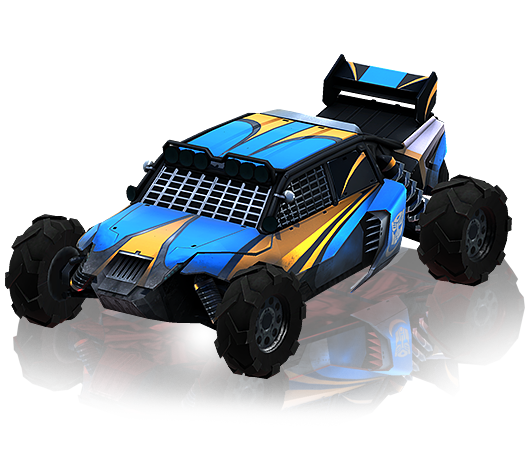
“Catapult always makes the shot.”
—Prowl
Many don’t even realize Catapult exists at all. A mysterious loner who moves through the shadows, she struts with the confident swagger of a true gunslinger. And it’s not unjustified; this Autobot assassin has the skills to take down any enemy on the battlefield every time, moving effortlessly over any terrain to find the right vantage point and able to read cross-winds with ease. The only clue to her presence in the fight is the tag she scratches into the chassis of every Decepticon she offlines.
Her in-game weapons are the Nimbus Blaster Rifle, Xeno Shotgun, and Cygnus Sniper Rifle. Her Baja buggy alt-mode comes equipped with a gatling gun that damages spark.
Her in-game abilities are:
Phase Chamber — when active, Catapult's weapons bypass enemy shields and damage them directly.
Neural Motivator — increases the damage Catapult deals by optimizing her focus.
Energon Transfusion— turns the damage she does to enemies into healing for her.
Her active subsystem is "Spark Dispersal" which heals nearby Autobots whenever she takes out an enemy.
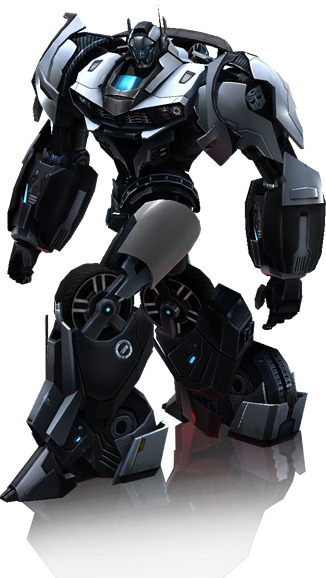

“When it comes to Doubletake... seeing is believing.”
—Prowl
A Cybertronian police enforcer and former Decepticon, Doubletake is rarely seen or heard by his targets until they’re on the verge of shutdown… And by then, he is already on his way to finding his next victim. Equipped to handle almost all combat situations, this reconnaissance expert can keep himself going while leaving lingering damage on his enemies.
His in-game Weapons are the Assail Laser Rifle, Solo SMGs, and Badlands Saws. His alt-mode comes equipped with a rocket launcher.
His in-game abilities are:
Plasma Taser — Nearby enemies get infused with periodic plasma damage, and any of them who currently have system interference get a plasma shock to the shields.
Bulletproof — provides Doubletake with a force field which reduces incoming damage.
Cyber Warfare — nearby enemies get system interference, while Doubletake and his nearby allies get system boots.
His active subsystem is "Silent Counter", which leaves lingering plasma damage on nearby enemies when he receives a critical hit.
Doubletake is one of the six Founders Pack exclusive characters for Transformers Universe.

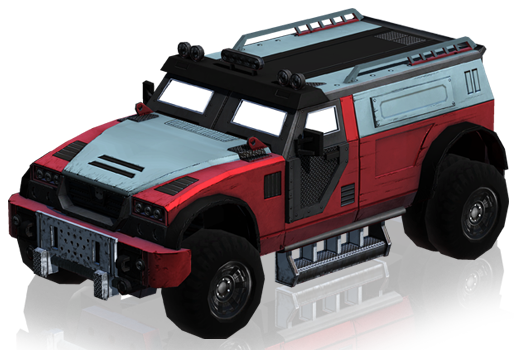
“As the first bot in line, Front-Line stands alone.”
—Bulkhead
Before the war, Front-Line was a vigilante known for getting to the scene of a crime first, crashing through the gates and smashing together criminal heads. Bad guys that met him were more likely headed to a scrap pile or a critical med bay than to a jail cell. Now he puts all that combat skill and power to work as an Autobot close combat specialist, annihilating Decepticons close up and personal on the front line of the battlefield.
His in-game weapons are the Orbital Minigun, Riot Hand Axes, and High-Rise Hammer. His vehicle mode can fire a shockwave cannon that damages spark.
His in-game abilities are:
Reduction Inducer — slows down enemy movement and reduces their damage resistance as a result of Front-Line's morale circuits emitting an interference signal.
Deflection Grid — projects a "defense matrix" which negates incoming ranged attacks and some melee attacks.
Infantry Overdrive — increases the movement speed of Front-Line and his nearby fellows by rerouting power from his morale circuits to his articulators.
His active subsystem is "Critical Absorption" which positively fuels his Energon flow and S-Tech Gauge when he takes a critical hit.
Frontline was previously known as "Vanquish" in the 2012 beta but in the 2014 beta his name was changed as well as a couple of his weapons.


Macro is one hotshot Autobot - I'm real glad we get along.”
—General Freeman
Macro was literally designed for tactical espionage action, sneaking into enemy territory and slicing up Decepticons. Skilled at hiding and utilizing all manner of weaponry, Macro will often jam enemy transmissions and set things up for his brothers in arms to smash in 'Con faces.
His in-game weapons are the Rail Laser Rifle, Haze Grenade Launcher, and Delta Sword. When he transforms into his custom low-rider alt-mode, Macro has access to electric dumbfire rockets.
His in-game abilities are:
Ionic Scrambler — Emits an ionic cloud which makes Macro and his nearby allies harder to hit.
Atmospheric Optimizer — when Macro is in the Ionic Scrambler field or Camouflage Shield, his weapons do more damage.
Camouflage Shield — creates a cloaking shield under which Macro and his allies can hide, and reduces the damage Macro takes.
Macro's active subsystem is "Retaliation", granting him some level of buff to Memory-Edge S-tech when he gets damaged.
Strangely, Macro is the only warrior to have a hidden backstory within the game files. It details how he fled Cybertron at the end of the Golden Age, worked as a mechanic in Delta on Velocitron, and eventually encountered Optimus Prime while the Ark was visiting the planet. He chose to join the ship on its voyage, but sustained heavy damage in a battle before take off, and ended up in the repair bay in a coma as the ship headed for Earth.
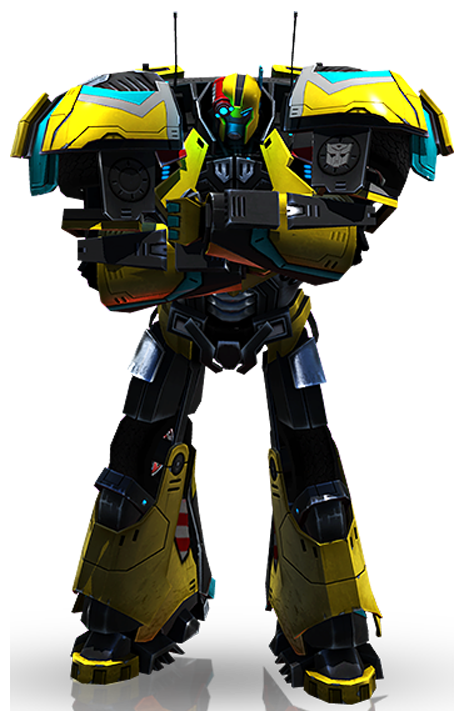
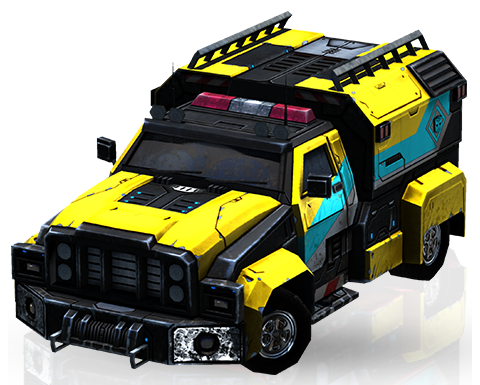
“If an Autobot is in trouble, Meltdown puts it all on the line.”
—Ironhide
Meltdown despises war but wouldn't dream of leaving a fellow Autobot behind to face it alone. His specialty is using beam weapons for repair or, if absolutely necessary, combat. It is rumored that he cares "too much" and has some emotional issues with combat, even closing his eyes rather than watching his missiles hit a living target. Still, those issues aside he is the best kind of health insurance to have on a battlefield. An Autobot "Guardian," he is designed to absorb massive amounts of damage and outfitted with everything needed to repair himself and other robots around him. Meltdown is all about controlling the battlefield and in addition to his durability and repair capabilities he can also paralyze and repel opponents.
His in-game Weapons are the Protex Rocket Launcher, Boraya Beam Gun, and Starstream Beam Gun. His multipurpose-utility-vehicle mode can fire long-ranged rockets that damages shields.
His in-game abilities are:
Beam Polarizer — when activated, Meltdown's Starstream Beam Gun boosts the damage of allies he's using it on, or dampens the damage inflicted by enemies he's shooting with it.
Repulsor Probe — drops a thumper probe which periodically causes vibrations which repel enemies.
Beam Protector — when active, if Meltdown fires either of his beam guns, his defenses are boosted.
His active subsystem is "Positronic Conduit" which repairs him for a percentage of damage.


“Meet the rainmaker.”
—Bulkhead
Like the tropical storm he is named after, Monsoon is not an Autobot you want to stand in the way of when he rolls onto the battlefield. At close range or a distance, this colossal fighter rains down destruction on the enemy, and after the fight’s done he uses his skills to heal up his comrades.
Monsoon was first revealed during Jagex's Twitch live stream on May 13th, 2014. It was also revealed that he would be one of the three starting Autobots you can choose, alongside Triage and Overclock.[2]
His in-game weapons are the Maelstrom Minigun, Gale Grenade Launcher, and Atlantean Axe. Transforming into an off road truck, Monsoon's alternate mode is armed with a rocket launcher that damages spark.
His in-game abilities are:
Primal Rage — "channels the essence of Primus into his spark chamber" and gives him a damage boost.
Climate Controller — gives repairs over time by optimizing his systems to work better depending on the weather.
Wind Tunnel — increases Monsoon's movement speed.
His active subsystem is "Mutual Affection", which increases the defence of any ally that heals him.


“Outsider and I share the belief that actions speak louder than words.”
—Optimus Prime
Outsider seems to have not quite fully grasped Earth culture. Despite his eccentric choice of alt mode, he is a bit of an antisocial lone-wolf. You're more likely to see him using his unique abilities to trap Decepticons in a small arena and then teleporting behind them than sitting around having a spark-to-spark.
His in-game weapons include the Luminal Laser Rifle, Apex Pistols, and Aquila Heavy Grenade Launcher. Transforming into a surfer bus, he uses a grenade launcher.
His in-game abilities are:
Unstable Receiver — creates a GroundBridge exit portal, which repairs Outsider and his allies while they're near it.
Localized Groundbridge — so long as a receiver is in range, GroundBridges Outsider to it and gives him the ability to spot cloaked enemies.
Matter Anchor — creates a gravity well to which nearby enemies are pulled.
His subsystem passive is "Servo Feedback", which slows down enemies using melee attacks.
He was apparently leaked after a couple of users on the Transformers Universe forums began tweaking around with the generic web address for all the model images for Autobot and Decepticon Warriors.[2][3]
#Transformers Universe#Transformers Prime#Transformers Aligned#aligned continuity#Transformers#TFP#TFU#Autobots#maccadam#video game#video games
21 notes
·
View notes
Text
The man no rational person would put in charge of the public’s health
ROBERT REICH
JAN 28
Friends,
Tomorrow, Robert F. Kennedy Jr. will appear before the Senate Finance Committee for the first of two confirmation hearings as Trump’s nominee for secretary of the Department of Health and Human Services.
This is a big deal. Kennedy Jr. is a nutcase and conspiracy theorist with racist tendencies.
If confirmed, he’d have sweeping control over 18 agencies critical to the nation’s health, including the Centers for Disease Control and Prevention, the Food and Drug Administration, the National Institutes of Health, and the Centers for Medicare and Medicaid Services.
In his confirmation hearings, keep your eye on these three big issues:
Vaccines
Kennedy Jr. has assured senators that he doesn’t want to take vaccines away from Americans but just wants to cast more “sunlight” onto the science behind them.
But his history of anti-vaccine advocacy has made those promises difficult to believe.
Over the past five years, Kennedy Jr. has repeated over 100 times false claims linking vaccines to autism — a theory debunked by decades of scientific research.
He has claimed that COVID-19 was “targeted to attack Caucasians and Black people” and that “the people who are most immune are Ashkenazi Jews and Chinese.”
And that “the Chinese are spending hundreds of millions of dollars developing ethnic bioweapons and we are developing ethnic bioweapons. They’re collecting Russian DNA. They’re collecting Chinese DNA so we can target people by race.”
He was a leading proponent of COVID-19 vaccine misinformation, erroneously suggesting the vaccine has killed more people than it has saved.
In his 2021 book, The Real Anthony Fauci: Bill Gates, Big Pharma, and the Global War on Democracy and Public Health, he alleged, without plausible evidence, that Dr. Fauci performed “genocidal experiments, sabotaged treatments for AIDS, and conspired with Bill Gates to suppress information about COVID-19.” This is libelous nonsense.
RFK Jr.’s misinformation about vaccines continues to endanger public health.
Kennedy Jr.’s nomination comes as childhood vaccination rates are falling. According to KFF, a nonprofit group that researches health policy issues, less than 93 percent of kindergartners had received all of their state-required vaccines in the 2023-2024 school year, compared with 95 percent in the 2019-2020 school year.
The secretary of Health and Human Services also shares with the surgeon general the nation’s highest pulpit for speaking about health care. That means that Kennedy Jr.’s anti-vax bias is likely to deter more parents from getting their children vaccinated.
The good news is we’ve largely eliminated these diseases. The bad news is we’ve eliminated the memory of these diseases. So parents are now more prone to worry about the safety of vaccines.
Kennedy has opposed vaccine mandates — including those for children to attend schools. He could direct the Center for Disease Control to remove requirements that children receive certain vaccines, and leave the decision up to parents or guardians.
He cold also stop shielding manufacturers and providers of COVID vaccines from legal liability — which would spur a tidal wave of litigation over alleged injuries from the shots.
Bird flu
The H5N1 bird flu virus is ripping across America. As of January 16, an estimated 928 herds of dairy cattle in 16 states have been infected, according to the Agriculture Department.
Experts worry that bird flu has the potential to set off another pandemic if it were to mutate to spread easily among people. So far, at least 67 cases have been found in people, mostly farmworkers. One person has died from the virus.
There have been no documented instances of human-to-human transmission of bird flu in the United States, at least so far.
Kennedy Jr. would oversee the CDC, which has managed much of the outbreak and tracked the risk to humans, as well as the Administration for Strategic Preparedness and Response, an agency responsible for managing the nation’s stockpile of flu vaccines, which currently includes two bird flu vaccine candidates.
He’d also have authority over the FDA, which would need to authorize the vaccines before they could be used in people.
Given his anti-vax advocacy, there is no reason to trust his judgment on any of this.
Public health insurance
If confirmed, Kennedy Jr. would also oversee Medicare, Medicaid, and the Affordable Care Act. Taken together, these three programs provide health insurance to more than half the American population.
Many Republicans in Congress want to let expire the subsidies that make Obamacare premiums more affordable. They have also expressed interest in imposing work requirements for Medicaid eligibility. Trump’s nominee to run the Centers for Medicare and Medicaid Services, Dr. Mehmet Oz, has previously expressed support for privatizing Medicare.
We don’t know Kennedy Jr.’s views on any of this, but I’m wary.
The bigger picture
Kennedy Jr. is not just a nutcase. He’s also a designated hitter in the oligarchy’s efforts to get government out of public health — and force Americans to rely instead on private for-profit corporations for their health insurance, hospitalization, vaccines, and pharmaceuticals.
These corporations continue to merge into giant for-profit monopolies and oligopolies.
Recall that Kennedy Jr.’s candidacy for president was supported by billionaire Timothy Mellon — grandson of Andrew Mellon and an heir to the Mellon banking fortune — who donated $15 million to Kennedy Jr.’s SuperPAC. (Mellon was also a major donor to PACs supporting Trump.)
Friends, I knew and worked for Robert F. Kennedy. Robert F. Kennedy Junior is no Robert F. Kennedy. Robert F. Kennedy was passionately committed to social justice. He would never have suggested that a deadly virus was targeted at certain races.
In 1962, when Robert F. Kennedy was President John F. Kennedy’s attorney general, JFK signed the Vaccination Assistance Act in order to, in the words of a CDC report, “achieve as quickly as possible the protection of the population, especially of all preschool children … through intensive immunization activity.”
The Senate should reject RFK Jr.’s nomination to be secretary of Health and Human Services.
7 notes
·
View notes
Text
Amanda Geduld at The Guardian:
A political battle over school-based Covid protocols in early 2021 quickly turned personal for one Colorado family, whose son’s cystic fibrosis – a life-threatening genetic disease affecting the lungs and other vital organs – made him susceptible to complications from the virus. Kate Gould said the classroom became a dangerous place for her son after hardline conservatives took over the Douglas county school board and the district removed masking requirements. After a prolonged back-and-forth, involving a pulmonologist and a special education attorney, district leaders finally agreed to an accommodation for his classroom, mandating masks. But mere weeks later, the superintendent was fired and, under new leadership, the district again removed the masking accommodation without consulting doctors or Gould, she told the 74 in a recent interview. Almost four years later, Gould and her family live in southern California – where they moved during the pandemic for the mask and vaccine requirements in place at the time – and they and other parents, advocates and health experts are gearing up for what could be the next front of the school culture wars: a broader attack on school vaccine mandates by the incoming Trump administration. Currently, all 50 states have vaccine requirements for children entering childcare and schools. But with Robert F Kennedy Jr – who has peddled baseless conspiracy theories and once said: “There’s no vaccine that is safe and effective” – potentially at the helm of the Department of Health and Human Services, advocates and parents are right to fear a rollback of requirements, enforcements and funding, according to interviews with about a dozen experts. “The anti-vax warriors have made it inside the castle walls,” said Richard Hughes, a George Washington University law professor who teaches a course on vaccine law. Kennedy’s legitimization and the different levers he could pull, experts told the 74, could have an immense impact on vaccination rates and the spread of preventable, contagious diseases in school-aged children. If confirmed by the US Senate, Kennedy would take control of an agency with a $1.7tn budget and 90,000 employees spread across 13 agencies, including the Food and Drug Administration and the Centers for Disease Control and Prevention (CDC). Dave Weldon, nominated by Donald Trump to head the CDC, has also endorsed debunked theories, blaming vaccines for autism and some chronic diseases.
[...]
While most school vaccine requirements come from states, the recommendations they’re based on begin with federal agencies, such as the CDC, and enforcement is often left up to local districts. This leaves room for both federal influence and “a hodgepodge of enforcement”, said Northe Saunders, executive director of the pro-vaccine Safe Communities Coalition, who sees battles around school-vaccination mandates playing out at the federal, state and school board levels. Experts agreed the federal government is highly unlikely to attempt to take vaccines off the market or categorically ban mandates, and most don’t anticipate individual states will do away with their long-standing requirements. But James Hodge, a public health law expert at Arizona State University’s Sandra Day O’Connor College of Law, pointed out: “You don’t actually have to pull the vaccine for people to stop using it. You have to raise doubts about it.” That can happen by planting seeds of misinformation, he said, or by starting to require that vaccines be assessed differently for approval or federal funding. Any slight drop-off in parents vaccinating their kids entering schools or daycare can result in disease outbreaks, an outcome Hodge said he expects to see over the next year or so. Such declines are already taking place.
[...] Parents across the country are able to apply for exemptions if their children are unable to get vaccinated for medical reasons. Most states also have religious exemptions, and 20 have some form of personal belief exemptions, leaving a varied landscape. School vaccine mandates have been around for more than a century, and while some pushback has always existed, it wasn’t until Covid that there was a real spike in vaccine hesitancy, according to Kate King, president of the National Association of School Nurses and a school nurse in Ohio. The source of the skepticism has shifted, too. Hodge, of ASU, said: “Rarely have we seen the federal government behind those debates in a way that this next administration could be.”
Randi Weingarten, president of the American Federation of Teachers, sees the potential “unraveling of decades and generations of protective vaccines”. For a vaccine to get approved, it must first go through an advisory committee at the FDA. Another committee at the CDC then develops recommendations for vaccine schedules, which state legislators rely on to determine their school policies. Kennedy would have an enormous impact on who serves on these committees, and he could stack them with anti-vaccine advocates. Kennedy could also request a review of all vaccines that have been previously approved by the FDA and subject them to new requirements. Many vaccines are paid for by the federal government. If Congress – under HHS’s direction or on their own – were to begin pulling that money, some of the most vulnerable children across the country could lose access to immunization. Trump has threatened to defund schools requiring vaccines for students. “The moment you start tacking on any price tag to a vaccination – any price tag whatsoever, even fairly minimal – you do see vaccination rates go down,” said Hodge. Beyond policy actions, experts warned of the power of rhetoric. The mere presence of a federal official who is skeptical – or outright hostile – towards vaccines gives the opposition more credibility. Since the enforcement of these policies is typically left up to a school district, some advocates are anticipating increased pressure on school board members to take anti-vaccine positions.
The normalization of anti-vaxxer extremism is one of the saddest things that has come to plague the USA in recent years, and that’s due to right-wing influencers and GOP politicians banging the drum about “freedom” with baseless innuendo about the efficacy of vaccines.
The potential confirmation of RFK Jr. to head up the HHS and Dave Weldon to head up the CDC will further confirm this disastrous normalization of this trend.
#Vaccine Mandates#Schools#Robert F. Kennedy Jr.#Vaccines#Anti Vaxxer Extremism#Mask Mandates#Dave Weldon#CDC#School Boards#Vaccine Hesitancy
6 notes
·
View notes
Note
New to this blog, so sorry if I’m missing a few points, but I was wondering if Core is able to enter the current Dreamtale, considering the state it’s in, would they be affected by the mass negative energy? If they can enter, do they just choose not to BECAUSE they can be affected?
What’s the take on letting survivors from Dreamtale that have been affected by the negativity like those wandering husks into the OT?
In general, for timelines that have survivors but they have some sort of deadly virus like infection that has something to do with their universe, would they be allowed in?
So for the first point, I don't think Core is affected by it. On account of the whole being omnipresent, I don't think they could be conceibably affected by the overwhelming negative energy. Like how core used to be scared of guns when they were alive, but they became desensitized when Omnipresent. Maybe if the negativity affected all of the multiverse, it'd do something.
On the matter of the husks, I consulted with my resident Dreamtale expert, and since the husks aren't capable of thought, it's probably a fool's errand to try and save them. Maybe Core would give it a shot, probably not- I don't know enough.
As for that last question, they'd probably try to accomodate them as much as possible. Like, maybe give them some magic shielding so they won't affect anyone, or just remove their infection outright (after all, there are some of the brightest minds in the multiverse working in the OT, someone's ought to figure it out).
24 notes
·
View notes
Text
When the lights went out across the Iberian Peninsula in April, everything ground to a halt. Scores of people were trapped in Madrid’s underground metro system. Hospitals in Lisbon had to switch to emergency generators. Internet service as far away as Greenland and Morocco went down.
While the cause remains unclear, the actual damage to the Iberian power grid—and the people it serves—was relatively minor. Less than 24 hours after the outage began, the region’s electricity operators managed to get the grid back online.
Even if things could have been much worse, the outage was both an unnerving reminder of how suddenly things can go offline.
For years, cybersecurity professionals, watchdogs, and government agencies have warned that a malicious cyberattack on the US power grid could be devastating. With ample evidence that state-sponsored hacking groups are eyeing the decentralized and deeply vulnerable power grid, the risk is more acute than ever.
Case in point: Hackers, believed to be linked to the Chinese government, spent years exploiting vulnerabilities in critical infrastructure across the mainland United States and Guam to obtain access to their systems. The operations, dubbed Volt Typhoon, could have used this access to shut down or disconnect parts of the American power grid—throwing millions into the dark. The effort was, luckily, disrupted and the vulnerabilities patched. Still, it is an unnerving illustration of just how vulnerable the electric system truly is.
We know what such a hack could look like. In 2015, Ukraine experienced the world’s first large-scale cyberattack on an electrical grid. A Russian military intelligence unit known as Sandworm disconnected various substations from the central grid and knocked hundreds of thousands of people offline.
The attack on Ukraine was repaired quickly, but cybersecurity experts have been warning for years that the next one might be more devastating.
Unlike Ukraine, America does not have a single power grid—it has three large interconnections, broken down into a network of smaller regional systems, some of which stretch into Canada. Most of the East is on one grid, most of the West is on another, while Texas and Alaska run their own interconnections. Keeping these networks running is a wildly complicated effort: There are thousands of utility operations, tens of thousands of substations, and hundreds of thousands of miles of high-voltage transmission lines.
To some degree, this decentralized network is an asset, as it means there is no core vulnerability that risks knocking the entire country offline. But the interconnections mean that a failure in one corner of the grid could cause a cascade that takes down the entire system.
In 2018, researchers from Northwestern University ran large-scale models, gaming out what would happen if parts of the grid failed. They found that, generally, the American power grid was resilient. However, they found that about 10 percent of power lines in the US were susceptible to the kind of failure that could trigger this domino effect under some conditions. A 2022 study that looked at possible disruptions to the Texas grid also found that, in some cases, a relatively small disruption could cause a series of downstream outages “rapidly in succession.”
This means that even if malicious actors manage to take only a small number of nodes in the network offline, it has the potential to do enormous downstream damage.
Insurance underwriter Lloyd’s of London has looked at the effects of such an outage. In this hypothetical, first drafted in 2015 but updated in the years since, Lloyd’s estimates that a Trojan virus that manages to infect just 50 generators—removing 10 percent of the grid’s total power—can trigger this cascade effect and knock out power for most of the East Coast, including New York City and Washington, DC. The Lloyd’s report states that this is an “extreme” but “not unrealistic scenario.”
“Images of a dark New York City make front pages worldwide,” they write, “accompanied by photographs of citizens stuck underground for hours on stranded subway cars and in elevators in the summer heat.”
These rolling blackouts would stretch through 36 states over the course of a day, throwing some 93 million people into the dark. It could take up to three days for half of those people to get back online—while hardware damage and other problems could require up to three weeks to fix.
As the outages continue, more difficulties arise. The analysts warn that an information campaign running parallel to the cyberattack could prompt strikes, protests, or general unrest.
In 2016, then Federal Emergency Management Agency administrator Craig Fugate was summoned to Congress to testify on the possible impacts of a cyberattack on the US electric grid. Water and wastewater systems are some of the first things to go down, he noted. “There is not really a good way to manage that if those systems go offline for extensive periods of time,” Fugate said.
He explained that the emergency response will become a game of triage: distributing enough power, gas, and generators to emergency services and utilities, while also trying to keep consumer-facing supply chains operating.
“Can you get enough life support and infrastructure going to keep the major supply lines up?” Fugate continued. “You are not going to have everything. You are not going to have what the normal consumption rates are.”
Lloyd’s estimates that the total economic costs and losses could hit $1 trillion.
9 notes
·
View notes
Text
In eagle nirvana, avian flu is decimating America’s national bird. (Washington Post)
Excerpt from this Washington Post story:
The research boat thumped over the waves on a crisp June morning, spraying William Bowerman as he peered into 136 square miles of lakes and a cerulean sky in Voyageurs National Park.
“This is my favorite day of the year, because I’m here in eagle nirvana,” said Bowerman, a bald-eagle researcher who has been coming to these waters for half of his 63 years.
He spoke nostalgically of recent summers when you could scale a 70-foot white pine, peer over the edge of a massive nest and observe healthy brown eaglets. And from that perch, you could see the next eagle nest a mile away, and beyond it a third.
But as Bowerman and his colleagues monitored the status of the park’s bald eagles on this perfect morning, they were finding no young birds — just empty nests and the occasional adult.
Seventeen years after the Fish and Wildlife Service removed the bald eagle from the endangered species list, signaling the comeback of an iconic species, a new enemy is stalking our national bird. Not lead from duck-hunter bullets, not DDT from insecticides, not PCBs from industrial polluters.
The enemy this time is avian influenza.
In Northern Michigan, where Bowerman, a University of Maryland professor, has spent 40 years continuing a long-running bald-eagle census, the number of occupied eagle nests had risen from 52 in 1961 to 114 in 1984 and about 1,000 by the end of 2021. Late that year, highly pathogenic avian influenza reached North America.
The impact was immediate and devastating. In 2022, the number of occupied nests plunged 50 percent. Tests on dead bald eagles performed by the Michigan Department of Natural Resources revealed that 38 percent of those that could be diagnosed had died of avian influenza.
In Minnesota, however, there are no comprehensive figures on the impact of the disease because the state does not collect all dead eagles for necropsy, the animal version of an autopsy.
Nationwide, avian influenza has killed at least 606 bald eagles in 45 states, according to findings from the Animal and Plant Health Inspection Service, part of the Department of Agriculture. And those are just the eagles whose remains have been recovered and tested; experts believe they represent only a small fraction of the true toll.
“The warning bell has been rung,” said Peter Nye, who started organizing New York state’s bald-eagle restoration program in 1975 when the state had just a single pair. When he retired in 2010, the number had risen to an estimated 450.
In Florida and Georgia, avian influenza has caused an alarming rate of bald eagle deaths and nest failures, researchers wrote in January 2023 in the journal Nature Scientific Reports. Nest success rates — the percentage that result in the birth of eaglets that learn to fly — dropped in the two-hardest hit Georgia counties, Camden and Glynn, by 43 percent and 62 percent respectively in 2022.
Eagles were nesting when the virus began to overrun the population.
“Waterfowl were dying, and the eagles were eating the waterfowl,” said Nicole Nemeth, lead author of the paper and head of the research and diagnostic service at the Southeastern Cooperative Wildlife Disease Study at the University of Georgia. The study, launched in 1957, receives dead wildlife from 17 states and has helped researchers evaluate the broader impact of avian influenza.
As dead eagles came into the study in 2022, the organizers heard the same basic story again and again.
“‘This was a nesting adult. We found it dead. A day or two later, we found the mate dead, and then the chicks died.’ It was sad, depressing, alarming,” Nemeth said. “It was like you were trying to sleep at night, and you just could not get out of your mind the fact that these birds were dropping dead.”
In a graphic video accompanying the journal study, an eagle infected with avian influenza jerked its head frantically and beat its wings, unable to rise more than a few feet from the ground.
Nemeth and her colleagues concluded that the eagle losses from avian flu offer a broader picture of the disease’s impact, “an early horizon scan of an emerging threat to populations of predatory and scavenging birds across North America.” Hundreds of hawks and owls have already been felled by the disease, according to federal figures.
6 notes
·
View notes
Text
5 Perks of Kissimmee Exterminator

Bug control is actually necessary for preserving a healthy as well as secure setting, specifically in position like Kissimmee, Fla, where the weather promotes a variety of bugs year-round. Listed below are actually 5 perks of insect control in Kissimmee:
1. Avoids Residential Property Damages
In Kissimmee, bugs like pests, rodents, as well as carpenter ants are notorious for creating substantial harm to each domestic and office homes. Pests, as an example, may quietly ruin the structural honesty of homes by devouring wood, causing pricey fixings. Mice such as rodents as well as mice may nibble through electric circuitry, protection, as well as plumbing system systems, posing fire risks or creating leakages. Efficient Kissimmee exterminator solutions aid secure your building from these forms of damages by pinpointing as well as removing bugs before they can easily induce danger.
2. Wellness Defense
Pests are not merely a nuisance; they can easily likewise position severe wellness risks. In Kissimmee, mosquitoes lug illness like West Nile virus as well as Zika, while cockroaches are actually recognized to cause allergic reactions and also bronchial asthma, especially in kids. Mice may disperse conditions by means of their droppings as well as urine, likely contaminating meals materials and also areas. Frequent parasite control avoids these health and wellness dangers through decreasing the variety of pests that can bring or transmit unsafe microorganisms, thereby securing the health and wellness of your family and pet dogs.
3. Stops Allergy Symptoms and also Bronchial Asthma
For lots of people, parasites including roaches, allergen, and rodents can trigger allergies or even breathing problem attacks. The droppings, lost skin, and spit of these bugs can be actually irritants that, when breathed in, worsen respiratory system concerns. Kissimmee individuals who experience bronchial asthma or allergic reactions might experience flare-ups from direct exposure to pest particles in their homes or offices. Regimen Kissimmee pest control solutions aid do away with the resource of these allergens, providing a cleaner, much safer atmosphere for those along with respiratory system sensitivities.
youtube
4. Assurance
Among one of the most significant benefits of expert pest control Kissimmee is the satisfaction it gives. Recognizing that your home or business is protected from insects indicates you won't have to continuously bother with animals occupying your residing room or organization properties. For businesses, a pest-free environment is actually vital for preserving a professional image and also ensuring the convenience and safety of clients. For property owners, it suggests that you can easily enjoy your space without the continual fear of finding a rodent nest or cockroach infestation. Bug control experts certainly not just take out insects however additionally assist protect against potential infestations through identifying susceptabilities in the structure of your home or even business.
5. Saves Opportunity and also Cash
While do-it-yourself pest control remedies may feel like an affordable strategy, they often fall short to totally do away with bugs or avoid future invasions. Parasite control professionals in Kissimmee are geared up along with the understanding, knowledge, and devices necessary to pinpoint the origin of the issue as well as offer enduring solutions. Through investing in professional pest control, homeowners and also company owner may conserve money in the end through avoiding pricey repairs resulted in by parasite harm or addressing repeating parasite problems. Additionally, time is actually saved by relying upon pros to take care of insect control as opposed to trying to take care of the concern on your own, liberating you approximately focus on various other concerns.
Result
Insect control solutions in Kissimmee give numerous benefits, consisting of defense from home harm, protecting health, preventing allergy symptoms and also asthma, supplying assurance, as well as saving each opportunity as well as loan. Along with the region's cozy, moist temperature that promotes pest populations, taking practical measures to address insect control can easily help you sustain a comfy, safe, and pest-free atmosphere. Whether you are actually a home owner or even entrepreneur, acquiring specialist insect control makes sure that parasites will not be a concern in your room.
All American Pest Control
1101 Miranda Lane, Suite 131
Kissimmee, FL 34741
(321) 337-0919
Kissimmee Pest Control
2 notes
·
View notes
Text
Zooplankton—tiny aquatic animals known to graze on bacteria—are ineffective at removing fecal microorganisms from sewage-contaminated water, according to a new study.
The findings challenged the assumptions of the researchers that these tiny animals could act as natural cleaners by inactivating harmful pathogens in freshwater and saltwater environments.
The hypothesis was that zooplankton would consume or neutralize fecal microorganisms, potentially reducing the risk to human health after water contamination. But the results told a different story.
"I was expecting to see a negative effect associated with the plankton present, but if anything, we saw a very small positive effect from the presence of plankton for a few locations sampled, which suggests that the pathogens in some cases are actually protected while associated with the plankton," the study's corresponding author, Lauren Kennedy, told Newsweek. "That surprised me the most."
The team's research comes at a crucial time. A 2017 U.S. water quality report found that over 50 percent of rivers, bays and estuaries were unsafe for at least one use, with fecal contamination being a major factor.
This poses serious health risks when humans are exposed to untreated water, which can occur due to sewage leaks, inadequate water treatment or corroded infrastructure.
In their experiment, the researchers added two common proxies for fecal contamination—E. coli bacteria and MS2, a virus commonly found in sewage—to water samples from the San Francisco Bay area.
These samples contained both large particles, such as zooplankton, and smaller, dissolved materials like salt.
Surprisingly, they found that the zooplankton had little effect on reducing the presence of the contaminants. Instead, higher salinity levels were linked to greater inactivation of the harmful microorganisms. Ocean water taken from San Pedro Beach, for example, showed that the pathogens were inactivated.
However, as the study wasn't designed to specifically test the effects of salinity, it's not possible to attribute the trends with absolute certainty.
"Regardless, I think implications are that salinity is a complex but important factor that needs to be assessed, for example, when trying to predict how long after a contamination event there will be an elevated risk of swimming in the water," Kennedy said.
The findings are particularly significant for water quality management. Many areas across the U.S. face frequent sewage spills, and local governments rely on natural processes to treat water contamination when resources for intervention are limited. The assumption that zooplankton might help in this process, however, may no longer hold water.
Kennedy added, "In the U.S., we handle the issue of pathogen pollution by allowing people who put wastewater into natural water bodies a certain level of pollutant that can be detected in the water body per day to ensure a lower human health risk.
"These thresholds are difficult to calculate and heavily dependent on the environmental conditions in the water body. This study provides an example for how to assess the effect of large particles, including plankton, when attempting to calculate these values and demonstrates the importance of particle characterization in environmental water bodies."
Is there a health issue that's worrying you? Do you have a question about the sewage spills? Let us know via [email protected]. We can ask experts for advice, and your story could be featured on Newsweek.
References
Kennedya, L. C., Mattisa, A. M., & Boehma, A. B. (2024). You can bring plankton to fecal indicator organisms, but you cannot make the plankton graze: particle contribution to E. coli and MS2 inactivation in surface waters. mSphere. https://journals.asm.org/doi/10.1128/msphere.00656-24
5 notes
·
View notes